2012版中考一轮复习英语精品课件人教版七年级上下册(4课时130张ppt)
文档属性
| 名称 | 2012版中考一轮复习英语精品课件人教版七年级上下册(4课时130张ppt) | 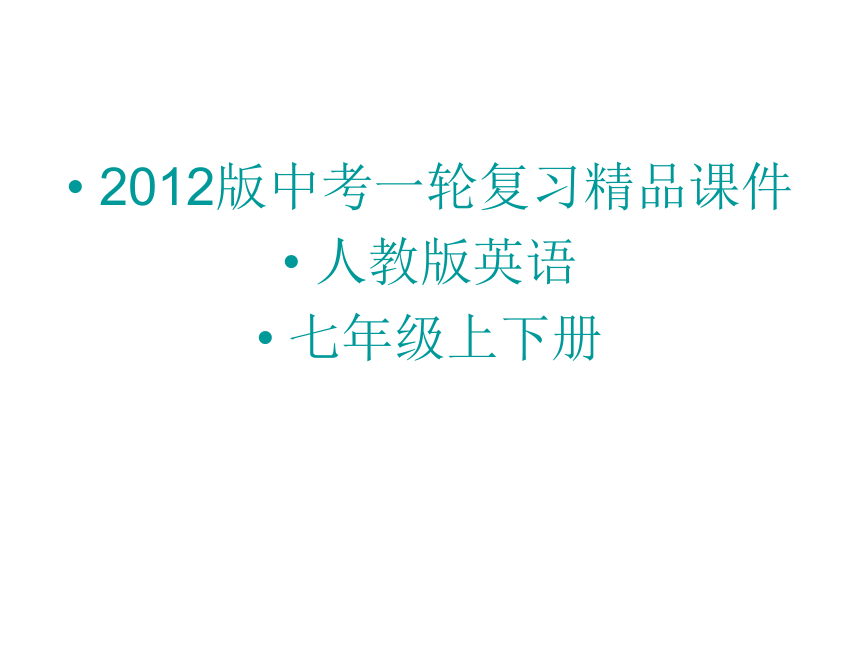 | |
| 格式 | rar | ||
| 文件大小 | 1.1MB | ||
| 资源类型 | 教案 | ||
| 版本资源 | 通用版 | ||
| 科目 | 英语 | ||
| 更新时间 | 2013-06-11 18:43:18 | ||
图片预览

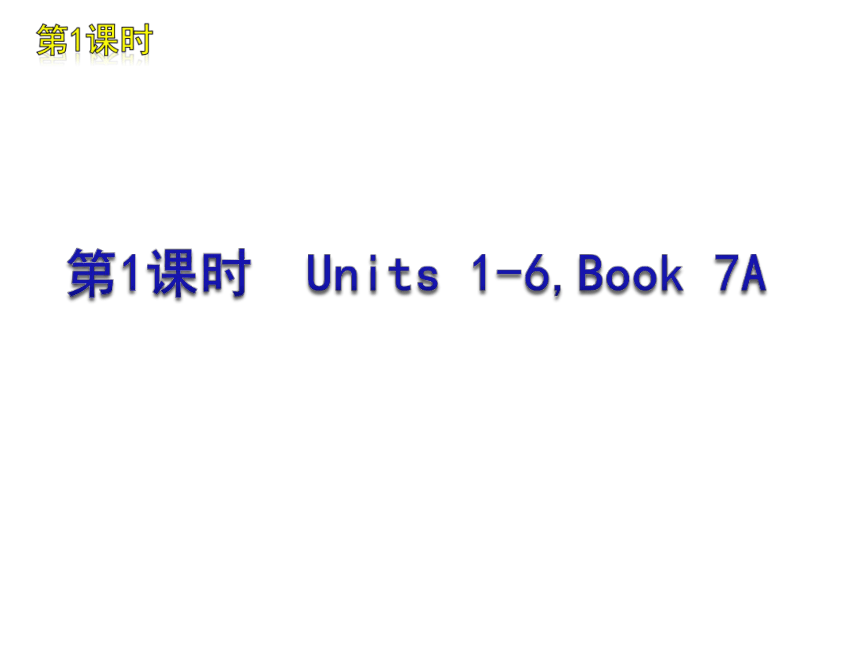
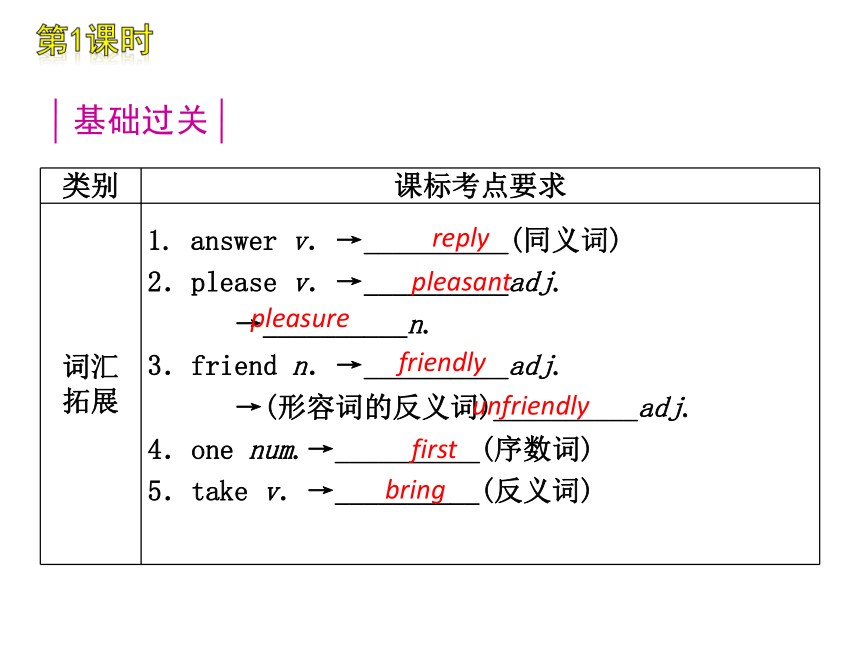
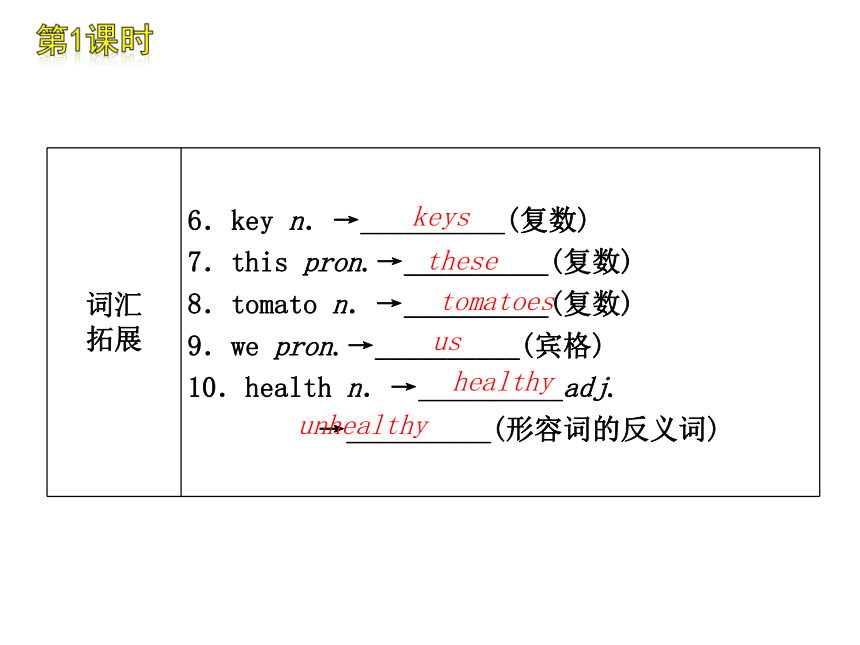
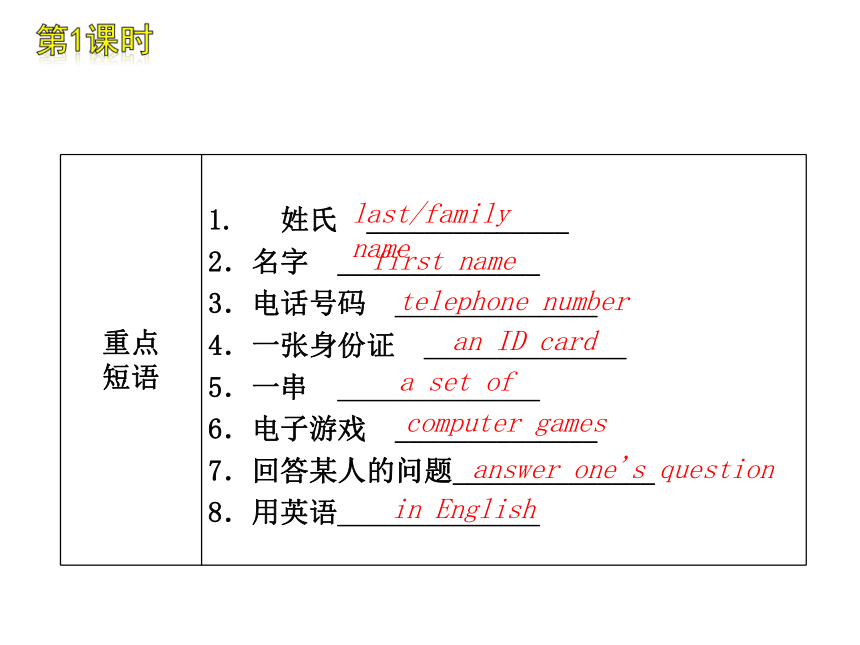
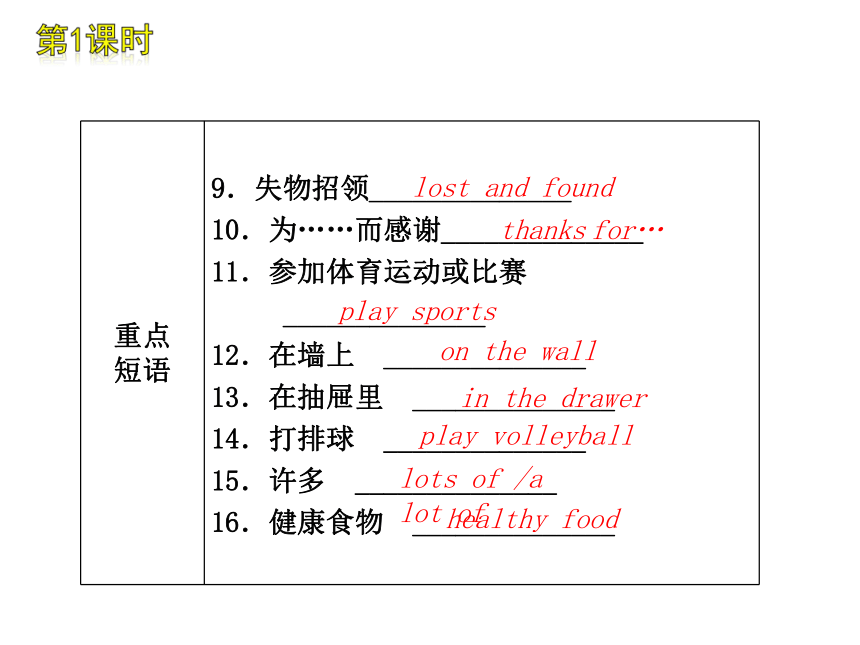
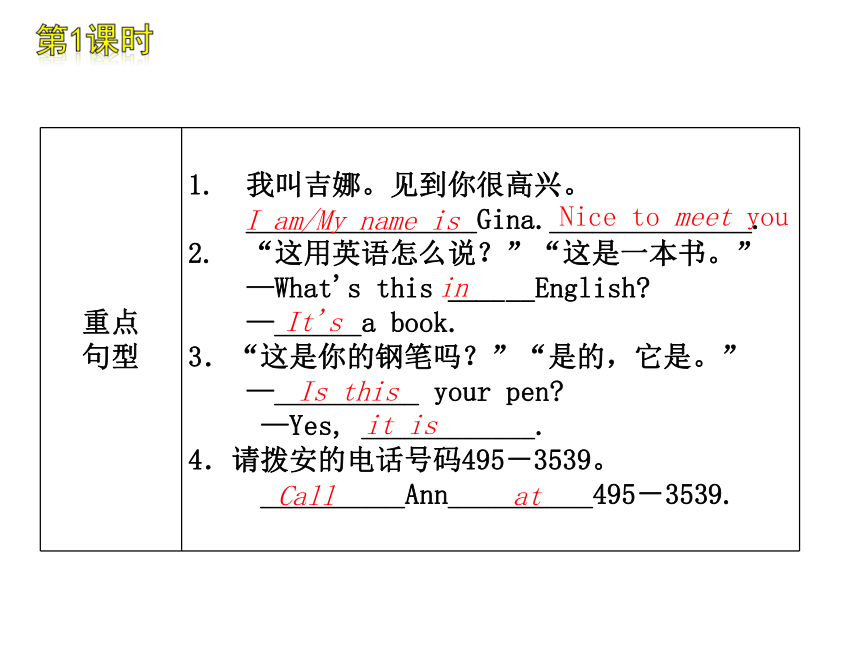
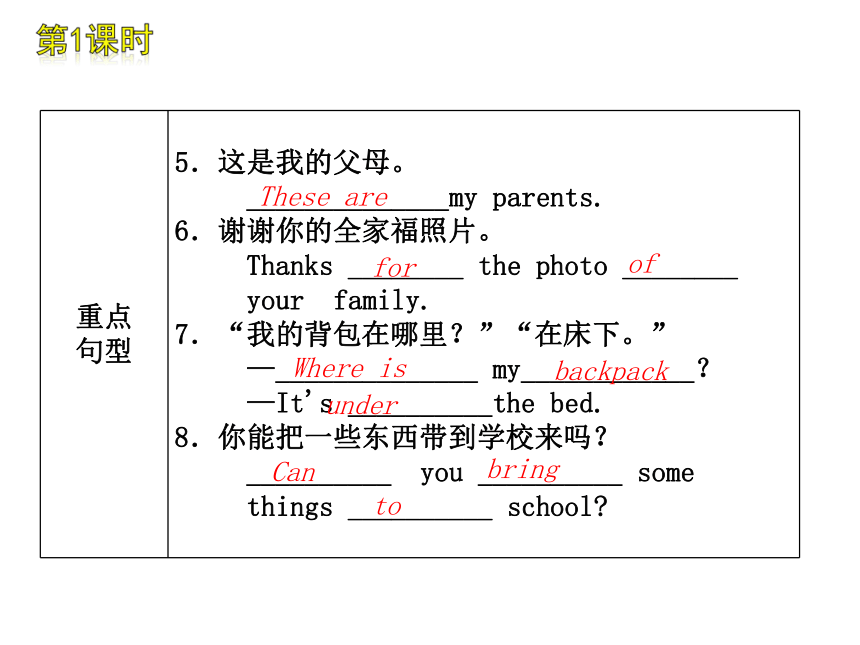
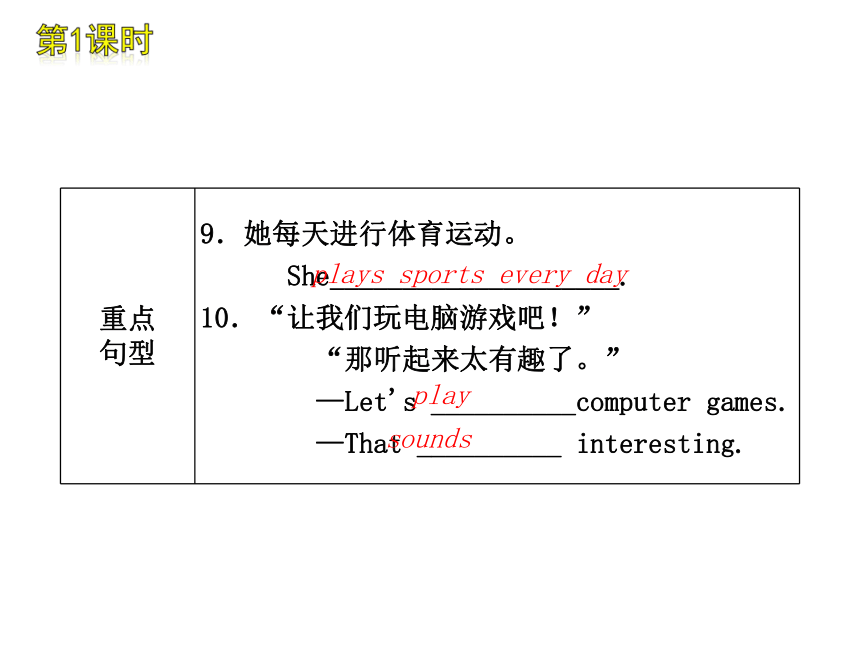
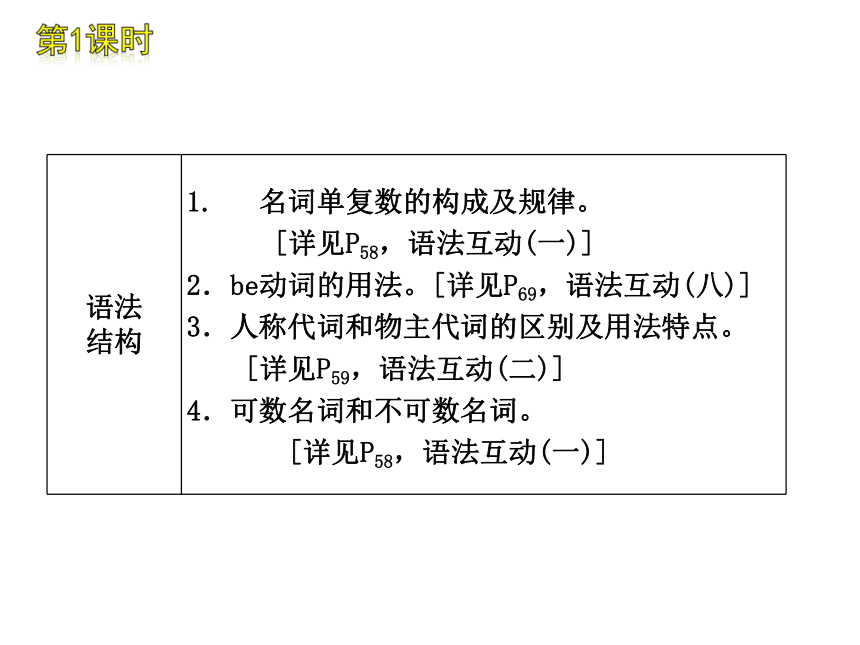
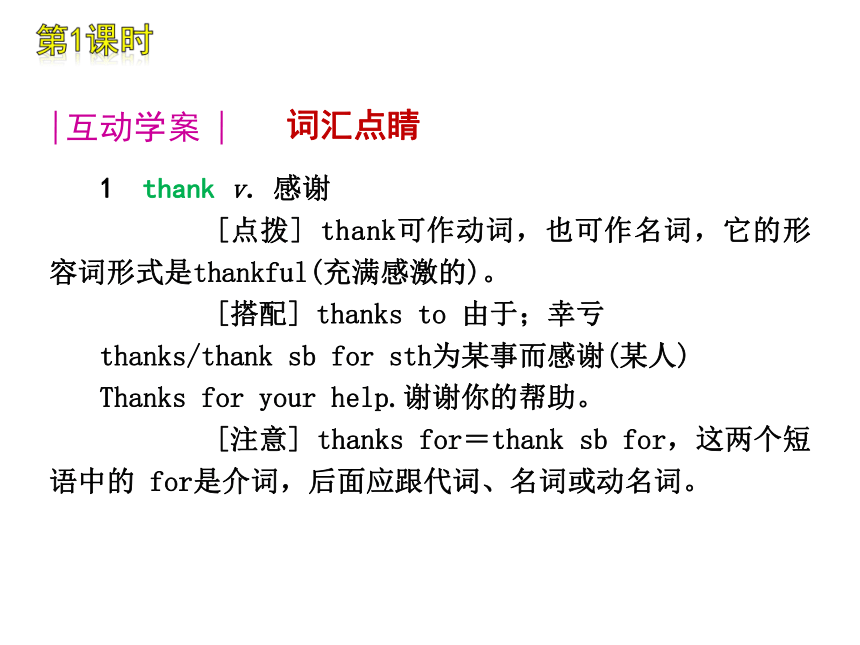
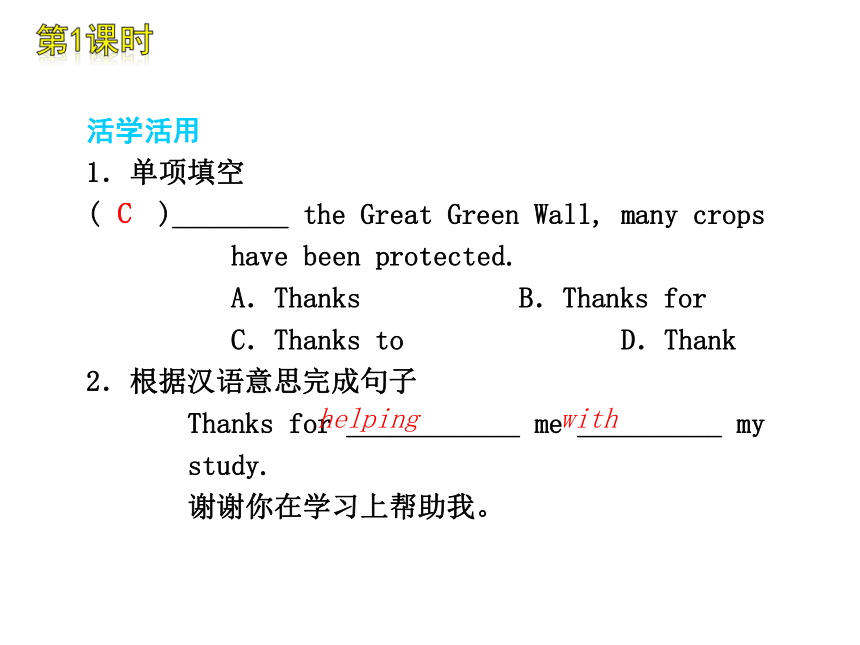
文档简介
(共130张PPT)
2012版中考一轮复习精品课件
人教版英语
七年级上下册
·河南省专用
基础过关
·河南省专用
类别 课标考点要求
词汇
拓展 answer v.→__________(同义词)
2.please v.→__________adj.
→__________n.
3.friend n.→__________adj.
→(形容词的反义词)__________adj.
4.one num.→__________(序数词)
5.take v.→__________(反义词)
reply
pleasant
pleasure
friendly
unfriendly
first
bring
·河南省专用
词汇
拓展 6.key n.→__________(复数)
7.this pron.→__________(复数)
8.tomato n.→__________(复数)
9.we pron.→__________(宾格)
10.health n.→__________adj.
→__________(形容词的反义词)
keys
tomatoes
these
us
healthy
unhealthy
·河南省专用
重点
短语
1. 姓氏 ______________
2.名字 ______________
3.电话号码 ______________
4.一张身份证 ______________
5.一串 ______________
6.电子游戏 ______________
7.回答某人的问题______________
8.用英语______________
last/family name
first name
telephone number
an ID card
a set of
computer games
answer one's question
in English
·河南省专用
重点
短语 9.失物招领______________
10.为……而感谢______________
11.参加体育运动或比赛
______________
12.在墙上 ______________
13.在抽屉里 ______________
14.打排球 ______________
15.许多 ______________
16.健康食物 ______________
lost and found
thanks for…
play sports
on the wall
in the drawer
play volleyball
lots of /a lot of
healthy food
·河南省专用
重点
句型
1. 我叫吉娜。见到你很高兴。
________________Gina.______________.
2. “这用英语怎么说?”“这是一本书。”
—What's this ______English
—______a book.
3.“这是你的钢笔吗?”“是的,它是。”
—__________ your pen
—Yes, ____________.
4.请拨安的电话号码495-3539。
__________Ann__________495-3539.
I am/My name is
Nice to meet you
in
It's
Is this
it is
Call
at
·河南省专用
重点
句型
5.这是我的父母。
______________my parents.
6.谢谢你的全家福照片。
Thanks ________ the photo ________
your family.
7.“我的背包在哪里?”“在床下。”
—______________ my____________?
—It's __________the bed.
8.你能把一些东西带到学校来吗?
__________ you __________ some
things __________ school
These are
for
of
Where is
backpack
under
Can
bring
to
·河南省专用
重点
句型 9.她每天进行体育运动。
She____________________.
10.“让我们玩电脑游戏吧!”
“那听起来太有趣了。”
—Let's __________computer games.
—That __________ interesting.
plays sports every day
play
sounds
·河南省专用
语法
结构 1. 名词单复数的构成及规律。
[详见P58,语法互动(一)]
2.be动词的用法。[详见P69,语法互动(八)]
3.人称代词和物主代词的区别及用法特点。
[详见P59,语法互动(二)]
4.可数名词和不可数名词。
[详见P58,语法互动(一)]
·河南省专用
1 thank v.感谢
[点拨] thank可作动词,也可作名词,它的形容词形式是thankful(充满感激的)。
[搭配] thanks to 由于;幸亏
thanks/thank sb for sth为某事而感谢(某人)
Thanks for your help.谢谢你的帮助。
[注意] thanks for=thank sb for,这两个短语中的 for是介词,后面应跟代词、名词或动名词。
词汇点睛
互动学案
·河南省专用
活学活用
1.单项填空
( )________ the Great Green Wall, many crops
have been protected.
A.Thanks B.Thanks for
C.Thanks to D.Thank
2.根据汉语意思完成句子
Thanks for ____________ me __________ my
study.
谢谢你在学习上帮助我。
C
helping
with
·河南省专用
2 one num.& pron. 一;一个
[点拨] one可作基数词,也可作代词,它的序数词为first,意为“第一”。
I don't like red apples. Please give me green ones.
我不喜欢红苹果,请给我一些青苹果。
[注意] (1)one可用来代替上文提到的一个人或物。如果是两个或两个以上可数的人或物,用ones代替。
(2)注意one与it在指代前面所提到的名词时的区别:one指同类中不确定的一个事物;it指上文提到的同一个事物。
·河南省专用
活学活用
( )(1)His full name is James Allan Green,
so his ________ name is James.
A.one B.first
C.last D.family
( )(2)—Do you have a red bike
—No,I have a black________.
A.it B.one
C.ones D.that
B
B
·河南省专用
3 take 与 bring
[辨析] (1)take v.拿走;带走。take…to…把某物从……带到……
(2)bring v.拿来;带来。bring…to…把某物从……带到……来
Please take the CD to Mary.
请把这张CD带给玛丽。
Bring your book to school, please.
请把你的书带到学校来。
·河南省专用
活学活用
1.单项填空
( )—It's half an hour's walk from here
to the bus station.
—Don't worry. I'll________you there.
A.bring B.get
C.carry D.take
2.用take或bring完成句子
Please ________ the empty bottle away and
________ the full one here.
D
take
bring
·河南省专用
4 have v.有;吃;喝
[点拨] (1)have表示“有”,是指某人拥有,强调所属关系,它的定形式是don't have。当主语是第三人称单数时用has。
I have a new pen. 我有一支新钢笔。
He has a basketball. 他有一个篮球。
(2)have还有“吃;喝”的意思。
We have/eat breakfast at 7 o'clock in the morning every day.我们每天早上7点吃早餐。
Do you want to have/drink some orange
你想喝点橙汁吗?
·河南省专用
[搭配] have breakfast/lunch/supper(dinner)
吃早/午/晚餐
have a look 看一看
have a rest 休息一下
have a good time 玩得很愉快
have a word with 和……说句话
活学活用
( )Jack usually ________ eggs and milk for
breakfast.
A.have B.eat
C.eating D.has
D
·河南省专用
5 sound v.听起来
[点拨] sound作“听起来”讲时,是系动词,后接形容词作表语。类似用法的词有look, feel, smell, taste等。
—Well, let's play volleyball.
—That sounds good.
“我们玩排球吧。”“听起来不错。”
She looks beautiful.她看起来很漂亮。
.
·河南省专用
活学活用
( )—Do you like the chicken soup?
—Yes, it ________ nice.
A.is tasted B.is tasting
C.taste D.tastes
.
D
·河南省专用
6 some与any
[辨析] (1)some意为“若干;一些”,常用于肯定句中。作定语时,它可以修饰可数名词的复数,也可以修饰不可数名词。
(2)any意为“一些;任何”,常用于否定句和疑问句中,也可以用在if条件句中。
[注意] (1)some有时也用在疑问句中,表示希望得到肯定回答。
(2)any也可以用于肯定句,这时它的意思是“任何”,而不是“一些”。
·河南省专用
活学活用
(1) Can I have ________ meat, Mum?
妈妈,我可以吃些肉吗?
(2) ________ man knows that.
任何人都知道那件事。
(3) I don't have ________ ink now.
现在我没有墨水了。
some
Any
any
·河南省专用
句型透视
1 Nice to meet you!见到你很高兴!
[点拨] 此句常用在人们初次见面的场合。其应答语为:Nice to meet you, too.(见到你我也很高兴。)
[拓展] 在同一场合中,还可以用How do you do?来打招呼,其应答语也是How do you do
·河南省专用
2 Excuse me, Sonia.打扰了,索尼娅。
[点拨] Excuse me意为“请原谅;对不起;劳驾”,常用于与陌生人搭话,打断别人说话等场合,一般在事前请他人帮忙或需要打扰别人时使用。
Excuse me. Which is the way to the park
打扰一下,去公园怎么走?
[拓展] I'm sorry./Sorry.意为“对不起;抱歉”,一般用于事后对所犯错误或不能满足对方要求等表示歉意。
I'm sorry. I lost your ruler.
对不起,我把你的尺子弄丢了。
·河南省专用
活学活用
( )________. Can I use your car?
A.I'm sorry B.Excuse me
C.Thank you D.That's OK
B
·河南省专用
3 —Is this your pencil
—Yes, it is.
“这是你的铅笔吗?”
“是的。”
[点拨] 这是一个含be动词的一般疑问句,用来询问某事物或情况是否属实,往往需要对方用yes或no来回答。
[注意] 当指示代词this/that在一般疑问句中作主语时,其答语中常用it代替;当指示代词these/those在一般疑问句中作主语时,其答语中常用they代替。
·河南省专用
活学活用
(1)—Is that his book
—No, __________ __________.
“那是他的书吗?”
“不是。”
(2)—Are these your parents
—Yes, __________ __________.
“这是你的父母吗?”
“是的。”
it isn't
they are
·河南省专用
4 Let's play soccer.我们踢足球吧。
[点拨] let sb do sth 是祈使句结构,表示“让某人做某事”,用于提出建议或征求意见。回答时,如果同意,可以说OK.或All right.等。如不同意,则说Sorry, I….或No, let's….其中,sb如果是人称代词,要用宾格形式,动词用原形。
当表示“让某人不做某事”时,用let sb not do sth。
Let's not worry about it .我们别担心这事了。
·河南省专用
[注意] 祈使句的另外两种常见表现形式如下:
Do型 如:Open the door. 打开门。
Be型 如:Be careful. 小心。
它们的否定句一般在句首加don't。
Don't tell him the truth .别告诉他真相。
·河南省专用
高频考点
( )1. I think ________ is a student.
A.she B.her
C.him D.I
( )2. This is ________ eraser. That is
________pencil.
A.a; an B.an; a
C.a; a D.an; an
( )3. Please________these books to your
teacher. She's in her office.
A.bring B.put
C.have D.take
A
B
D
·河南省专用
( )4. I can see many ________ in these ________.
A.tomatoes; photoes
B.tomatoes; photos
C.tomatos; photoes
D.tomatos; photos
( )5. He ________ have ________ soccer balls.
A.doesn't; some
B.doesn't; any
C.don't; some
D.don't; any
B
B
·河南省专用
基础过关
·河南省专用
类别 课标考点要求
词汇
拓展 1. five num.→__________(序数词)
2.nine num.→__________(序数词)
3.twenty num.→__________(序数词)
4.you pron.→_________________(反身代词)
5.little adj.→__________(比较级)
fifth
ninth
twentieth
yourself/yourselves
less
·河南省专用
词汇
拓展 6.act v.→__________n. (作为)→_________
n.(男演员)→__________n.(女演员)
7.science n.→__________n.(科学家)
8.speak v.→__________n.
9.tooth n.→__________(复数)
10.hobby n.→__________(复数)
action
actor
actress
scientist
speech
teeth
hobbies
·河南省专用
重点
短语
1. 看一看 ______________
2.去看电影 ______________
3.了解 ______________
4.加入象棋俱乐部______________
5.在某事上帮助某人 ______________
6.起床 ______________
7.去上学 ______________
8.到达 ______________
have a look
go to the movies/a movie
learn about
join the chess club
help sb with sth
get up
go to school
get to/arrive at/in
·河南省专用
重点
短语 9.廉价出售 ______________
10.演讲比赛 ______________
11.学校郊游 ______________
12.在周末 ______________
13.弹吉他 ______________
14.音乐节 ______________
15.淋浴;洗澡 ______________
16.下棋______________
on sale
speech contest
school trip
on weekends
play the guitar
music festival
take/have a bath(shower)
play chess
·河南省专用
重点
句型 1. “这件蓝色的裙子多少钱?”“7美元。”
—________________is the blue skirt
—It's________________.
2.所有人都能承受得起我们的价格。
Anybody can__________our__________.
3.“你的生日是什么时候?”
“我的生日是11月10日。”
—____________your____________?
—____________ is____________.
How much
seven dollars
afford
prices
When is
birthday
My birthday
November 10th
·河南省专用
重点
句型
4. “你喜欢哪类电影?”
“我喜欢动作片和恐怖片。”
—____________________do you like
—I like ____________________thrillers.
5.你想去看电影吗?
Do you want_______________________
6.“你会跳舞吗?”“是的,我会。”
—________you________?
—Yes, ___________.
What kind of movies
action movies and
to go to a movie
Can
dance
I can
·河南省专用
重点
句型
7.你想加入什么俱乐部?
What _______do you want to________?
8.你通常什么时候起床?
What _______do you______________
9.你最喜欢的课程是什么?
What__________________________
10.“你为什么喜欢体育课?”“因为它有趣。”
—Why__________________________?
—Because it's fun.
club
join
time
usually get up
is your favorite subject
do you like PE
·河南省专用
语法
结构 1.询问价格、日期及时间的特殊疑问句及答语。
2.基数词和序数词。
[详见P62,语法互动(四)]
3.一般现在时。[详见P71,语法互动(九)]
4.名词所有格。[详见P58,语法互动(一)]
·河南省专用
词汇点睛
互动学案
1 help v.& n.帮助
[搭配] help sb (to)do sth 帮助某人做某事
help sb with sth 在某事上帮助某人
with the help of sb 在某人的帮助下
We all must try to help each other.
我们都必须努力互相帮助。
With my teacher's help, I passed the exam.
在老师的帮助下,我通过了考试。
[拓展] 当你去购物或就餐时,服务员常说Can I help you
·河南省专用
2 look, see, watch与read
[辨析] (1)look 意思是“(用心地)看”,是不及物动词,加介词at后才可接宾语。它强调“看”动作本身。
(2)see意思是“看见”,是及物动词,后可直接跟宾语。它强调看的结果。
(3)watch 意思是“观看”,是及物动词,多指观看运动的事物,如电视比赛等。
(4)read意思是“读,看”,通常指读文字材料等。
·河南省专用
活学活用
(1) I like ____________ football games.
我喜欢看足球比赛。
(2) ________! He's playing basketball.
看!他在打篮球。
(3) We ________ the blackboard, but we couldn't
________anything.
我们看着黑板,但什么也看不见。
watching
Look
looked at
see
·河南省专用
3 look for, find与find out
[辨析] (1)look for 意思是“寻找”,强调找的动作和过程。
(2)find 意思是“找到,发现”,强调找的结果。
(3)find out 意思是“查出,获知”,强调经过研究、调查而得。
·河南省专用
活学活用
(1) Can you ____________ what time the train
leaves
你能查出火车什么时候开吗?
(2) I'm ________________ my eraser.
我正在找我的橡皮擦。
(3) I______________ my book in my backpack, but I
couldn't ____________it there.
我在背包里找我的书,但找不到。
find out
looking for
looked for
find
·河南省专用
4 listen vi.听
[点拨] listen意为“听”,为不及物动词,后面跟宾语时,必须加介词to。
Listen! Someone is singing in the next room.
听!有人在隔壁唱歌。
We should listen to the teacher carefully in class.
课堂上我们应当认真听老师讲课。
[辨析] listen to与hear
listen to表示“听”的过程;hear表示“听”的结果,意为“听到”。类似的还有:look at与see;look for与find等。
·河南省专用
活学活用
( )Please ________ me carefully . By the way,
can you ________ me clearly
A.listen to; listen to B.hear; hear
C.listen to; hear D.hear; listen to
C
·河南省专用
5 busy adj.繁忙的;忙碌的
[点拨] busy为形容词,它的反义词是free(空闲的)。名词是business,指“生意;买卖”。
[搭配] be busy with sth 忙于某事
be busy doing sth 忙于做某事
Are you busy with your homework
你正忙于做作业吗?
Mr Smith is busy writing a letter.
史密斯先生正忙着写信。
·河南省专用
6 strict adj.严格的;严厉的
[搭配] be strict with sb 对某人要求严厉
be strict in sth 对某事要求严格
She is very strict with her children and in her work.
她对待子女很严厉,对待工作很严格。
·河南省专用
7 job与work
[辨析] (1)job 是可数名词,指已做、要做或应做的具体工作,可与冠词连用。
I want to clean the room. It's my job.
我想去打扫房间。那是我的工作。
She's got a good job as a teacher.
她找到了一份做老师的好工作。
·河南省专用
(2)work 是不可数名词,通常指抽象意义上的工作,前面不能加不定冠词, 但有时可用定冠词the。work还可以作动词用。
I'm busy. I have a lot of work to do.
我很忙。我有许多工作要做。
He goes to work by bus every day.
他每天乘公共汽车去上班。
She works as a journalist.
她是一名记者。
·河南省专用
活学活用
( )Writing wall newspaper is ________
interesting work.
A.a B.an C.the D./
D
·河南省专用
8 say, speak, talk 与tell
[辨析] (1)say强调说话的内容。
I can say it in English.
(2)speak 作不及物动词时,强调说话的动作;作及物动词时,后面加语言。
The baby can't speak.
speak English说英语
(3)talk强调两个人之间的谈话。
talk with sb 和某人交谈
talk to sb about sth 和某人谈论某事
(4)tell“告诉;讲述”,后面常接双宾语。
tell sb a story给某人讲故事
·河南省专用
活学活用
(1)Did you ________ her the news?
你把这个消息告诉她了吗?
(2)She is ____________with Lucy in English.
她正在和露茜用英语交谈。
(3)What did he ________ about the new teacher
关于新老师,他都说了些什么?
(4)Did he ________ in the meeting
他在会议上发言了吗?
(5)I am sure that he is ________ a lie.
我确信,他在撒谎。
tell
talking
say
speak
telling
·河南省专用
句型透视
1 How much is this T shirt
这件T恤衫多少钱?
[点拨] how much 意为“多少”,在不同的语境中,有不同的含义。
(1)询问价格:
How much are these shoes?这些鞋多少钱?
(2)询问不可数名词的数量:
How much bread do you want 你想要多少面包?
·河南省专用
活学活用
(1)The dictionary is 10_dollars.(对画线部分提问)
________ ________is the dictionary
(2)How much is your new coat?(改成同义句)
What's ________ ________ ________your new
coat
How much
the price of
·河南省专用
2 I want to see a comedy.我想看喜剧。
[搭配] want sth 想要/需要某物;
want to do sth 想做某事;
want sb to do sth 想要某人做某事。
I want a dictionary. 我想要一本字典。
They want to play tennis. 他们想要打网球。
My parents want me to study hard at school.
我父母想要我在学校努力学习。
·河南省专用
What a funny time to eat breakfast!
这是一个多么有趣的用早餐的时间啊!
[点拨] 这是一个感叹句。
感叹句是用来表达人的特殊情感的句子,可以表达人的喜、怒、哀、乐等感情。感叹句可以是一个单词、一个不定式、一个短语构成的独立句, 也可由what和how来引导,句末常用叹号。
[拓展] (1)what引导的感叹句
①What+a/an+形容词+单数可数名词+主语+谓语动词!
What a nice girl Ann is!
安是个多好的女孩啊!
·河南省专用
②What+形容词+复数可数名词或不可数名词+主语+谓语动词!
What heavy snow it is!
多么大的雪啊!
(2)how引导的感叹句
①How+主语+谓语动词!
How time flies!
时光飞逝!
·河南省专用
②How+形容词或副词+主语+谓语动词!
How kind the girl is!
这个女孩多善良啊!
How fast he is running!
他跑得多快啊!
活学活用
( )(1)—________ beautiful day it is! Let's go and
have a picnic in the park.
—Good idea!
A.How B.How a
C.What D.What a
D
·河南省专用
( )(2)[2011·盐城] ________interesting it is to go
sailing in Qingdao in Summer!
A.What B.What an
C.How D.How an
C
·河南省专用
4 People usually eat dinner in the evening.
人们通常在晚上吃正餐。
[点拨] in the morning/afternoon/evening
在早上/下午/晚上
[拓展] 在使用时间介词at, in, on时应注意:
(1)at表示具体的时间。
at one o'clock; at noon; at night
(2)in表示世纪、年、季节、月和某一天的各部分。
in the 1980s; in 2011; in spring; in May; in the evening
·河南省专用
(3)on 表示具体某一天或具体某一天的上午、下午或晚上。
on a cold morning; on Teachers' Day; on that snowy day
注意:在含有this, that, next, last, tomorrow, yesterday等词或词组前不用介词。
·河南省专用
活学活用
( )(1)The famous writer William Shakespeare
was born ________ 1564.
A.in B.on C.at D.of
( )(2)The homeless grandpa died ________ a
cold morning.
A.in B.on C.at D.of
A
B
·河南省专用
高频考点
( )1. You can go out tonight,________ you must
come back earlier.
A.but B.so C.or D.and
( )2. May is the ________ month of the year.
A.four B.fourth C.five D.fifth
( )3. —________ is the sweater
—It's ten dollars.
A.How much B.How many
C.How long D.How often
( )4. Can you play ________ guitar
A.a B./ C.an D.the
A
D
A
D
·河南省专用
基础过关
·河南省专用
类别 课标考点要求
词汇
拓展 1. Canada n.→______________adj.
2.begin v.→______________n.
3.visit v.→______________ n.(游客)
4.dangerous adj. →______________ n.
→______________(形容词的反义词)
5.cross v.→______________prep.
Canadian
beginning
visitor
danger
safe
across
·河南省专用
词汇
拓展 6.clean adj.→_____________(反义词)
7.leaf n.→______________(复数)
8.child n.→______________(复数)
9.sun n.→______________adj.
10.lie v.→______________(现在分词)
dirty
leaves
children
sunny
lying
·河南省专用
重点
短语
1. 来自______________
2.紧靠;在旁边______________
3.向左拐______________
4.散步______________
5.旅途愉快______________
6.在……对面______________
7.径直走______________
8.玩得开心______________
come/be from
next to
turn left
take a walk
have a good trip
across from
go straight
have a good time/have fun
·河南省专用
重点
短语 9.坐出租车______________
10.去……的路______________
11.有点;有几分______________
12.在晚上______________
13.等待______________
14.在度假______________
15.照相______________
16.去购物______________
take a taxi
the way to…
kind of
at night
wait for
on vacation
take photos
go shopping
·河南省专用
重点
句型 1. “你的笔友来自哪里?”
“他来自澳大利亚。”
—____________your pen
pal________________
—He________________________.
2.“她讲什么语言?”“她讲英语。”
—What__________________________
—She ___________English.
3.我希望你旅途愉快。
I __________ you______________.
Where is/does
from/come from
language does she speak
speaks
hope
have a good trip
is from/comes from Australia
·河南省专用
重点
句型
4.“你为什么想看狮子?”“因为它们可爱。”
—_______do you want to__________
—__________they're__________.
5. 难道他不可爱吗?
__________he cute
6.“你是做什么工作的?”“我是个记者。”
—What____________________?
—I am____________________.
Why
see the lions
Because
cute
Isn't
do you do
a reporter
·河南省专用
重点
句型
7.“他想成为什么?”“他想成为一名教师。”
—What ________he_____________
—He ______________a teacher.
8.“你妹妹在哪里工作?”
“她在一家医院工作。”
—Where________ your sister ________?
—She________________________.
does
want to be
wants to be
does
work
works in a hospital
·河南省专用
语法
结构 1. There be 句型。[详见P78,语法互动(十二)]
2.现在进行时态。[详见P71,语法互动(九)]
3.why, what, where 引导的特殊疑问句。[详
见P77,语法互动(十三)]
·河南省专用
词汇点睛
互动学案
1 turn v.& n.转弯;拐弯;轮流
[点拨] (1)turn作动词讲时,意为“转弯;拐弯”,若接宾语则用介词to,如:turn to the left/right,意为“向左/右拐”,相当于turn left/right。
Please turn left at the second crossing.
请在第二个路口向左拐。
·河南省专用
(2)turn作名词讲时,意为“轮流;轮班”,其常用句型为It's one's turn to do sth,意为“轮到某人做某事”。
It's your turn to clean the blackboard.
轮到你擦黑板了。
(3)turn还可作系动词,意为“变得”,后接形容词作表语。
Trees turn green in spring.春天,树变绿了。
·河南省专用
2 kind n.种类 adj.友好的;和蔼的
[搭配] a kind of…一种……
all kinds of… 各种各样的……
kind of 有点;稍微;有几分
be kind to sb 对某人友好
There are all kinds of fruits in the supermarket.
超市里有各种各样的水果。
He is handsome, but kind of fat.
他长得很帅,但有点儿胖。
It's very kind of you to help me.
你能帮助我真是太好了。
·河南省专用
3 enjoy v.享受……的乐趣;欣赏
[搭配] enjoy doing sth 喜爱做某事
enjoy oneself=have a good time/have fun
玩得开心
She enjoys playing table tennis.
她喜欢打乒乓球。
They enjoyed themselves in the park.
他们在公园里玩得很开心。
·河南省专用
4 house, home与family
[辨析] (1)house意为“房子”,指居住的建筑物。
(2)home意为“家”,指一家人共同并经常居住的地方。
(3)family意为“家庭;家庭成员”,the family 指一家人时,谓语用复数。
·河南省专用
活学活用
(1)Please come to my ________ this afternoon.
今天下午请到我家来。
(2)He is not at ________.
他不在家。
(3)My ________ all get up early.
我们全家都起得很早。
house
home
family
·河南省专用
5 across与through
[辨析] (1)across含有“从……表面穿过”之意,指从某个范围的一边到另一边,或沿某一条线的方向而进行的动作。表示“乘船过海”或“过河”时也用它。词组across from意为“在……对面”。
He can swim across the river. 他能游过这条河。
(2)through含有“从……(内部空间)穿过”之意,往往指穿过沙漠、森林,(光线)透过窗户等。
She had to push her way through the crowd to meet her son.
为了和儿子相遇,她不得不在人群中挤出一条路。
·河南省专用
活学活用
( )(1)The pay phone is ________ from the
library.
A.through B.across
C.behind D.next
( )(2)They walked ________ the forest,and
got to another town at last.
A.through B.across
C.cross D.to
B
A
·河南省专用
6 also, too, either与as well as
[辨析] (1) also意为“也”,通常用于肯定句,置于句中。
(2)too 是also的同义词,但常用于句末。
(3)either意为“也”,通常用于否定句句末。
(4) as well as意为“也,还,而且”,常表示并列。连接并列的主语时,谓语动词应与其前面的主语在数上保持一致。
·河南省专用
活学活用
(1)You like PE. I________ like it very much.
你喜欢体育,我也非常喜欢。
(2)Englishmen speak English. Americans speak English, ________.
英国人说英语,美国人也说英语。
(3)Mrs White doesn't like action movies. Mr White doesn't,________.
怀特夫人不喜欢动作片,怀特先生也不喜欢。
(4) He ____________the students is over there.
除了学生以外,他也在那边。
also
too
either
as well as
·河南省专用
7 give v.给予;给
[点拨] give sb sth =give sth to sb
其中,sb 是间接宾语,sth 是直接宾语。当直接宾语是代词时,只能用give sth to sb 结构。
My mother gives me some apples.
=My mother gives some apples to me.
我妈妈给了我一些苹果。
Please give it to me.请把它给我。
(不能说:Please give me it.)
·河南省专用
[拓展] 有类似用法的词还有:
buy sb sth =buy sth for sb
pass sb sth =pass sth to sb
show sb sth =show sth to sb
·河南省专用
8 lie v.躺;位于;说谎 n.谎言
[点拨] (1)lie作动词,意为“躺,位于”时,其过去式、过去分词和现在分词分别为lay,lain和lying。
The girl is lying on the grass.
这个女孩正躺在草地上。
(2)lie作可数名词,意为“谎言”,其复数形式为lies。指“说谎”时,过去时,过去分词为lied, lied。
[搭配] lie to sb 向某人撒谎 tell a lie 说谎
·河南省专用
活学活用
用lie的适当形式填空并写出其汉语含义
(1) Some people are ________ on the beach.
_________
(2)Japan ________ to the east of China. ________
(3)The boy never________. ________
(4)Why did you tell me a________? ________
lying
躺
lies
位于
lies
说谎
lie
谎言
·河南省专用
9 wear, put on, dress与(be) in
[辨析] (1)wear表示状态,意为“穿着”。
(2)put on表示动作,意为“穿上;戴上”。
(3)dress意为“给……穿衣”,是及物动词,后接人作宾语。dress oneself意为“给自己穿衣服”;dress sb 意思是“给某人穿衣”;dress sb up意思是“穿上盛装,乔装打扮”。
(4)(be) in 意为“穿着;戴着”,表示状态,in后可以直接跟表示颜色的名词。
·河南省专用
活学活用
(1)Please ________ your coat. It's cold outside.
(2)She is ________ a red dress. She looks nice.
(3)My son is too young to ________ himself.
(4)He was all ________ black last night.
(5)I ________ a white uniform. He is ________ white, too.
put on
wearing
dress
in
wear
in
·河南省专用
10 between prep.介于(两者)之间
[辨析] between与among
between一般指两者之间,常与and连用,among一般用于三者或三者以上的人或物之间。
Our teacher is standing among the students.
我们的老师站在学生中间。
There is no secret between you and me.
你我之间没有秘密。
·河南省专用
活学活用
( )The little girl is sitting ________ her parents.
A.between B.from
C.among D.of
A
·河南省专用
句型透视
1 This is my new pen pal.She's from Australia.
这是我的新笔友。她来自澳大利亚。
[点拨] be from意为“来自于, 是……地方的人”,与come from同义。
[拓展] (1)询问“某人来自某地”的两个句型:
Where+be + 主语 + from
Where+do/does + 主语+come from
·河南省专用
(2)句中 Australia 是名词。我们学过的表示国家的名词及其形容词(名词)有:
America(美国)—American(美国的;美国人)
Canada(加拿大)—Canadian(加拿大的;加拿大人)
Japan(日本)—Japanese(日本的;日本人;日语)
China(中国)—Chinese(中国的;中国人;汉语)
England(英国)—English(英国的;英语)
France(法国)—French(法国的;法国人;法语)
Germany(德国)—German(德国的;德国人;德语)
·河南省专用
2 Isn't he cute?难道他不可爱吗?
[点拨] 一般疑问句的否定形式叫否定疑问句,意为“难道不……?”形式上是否定,实际表示肯定意义,表示惊奇、赞许和责备等。回答根据事实,肯定用yes,否定用No。如:
—Isn't he at home now 他不在家吗?
—Yes, he is./No, he isn't. 不,他在。/是的,他不在。
—Don't you know her name
难道你不知道她的名字吗?
—Yes, I do.不,我知道。/
—No, I don't.是的,我不知道。
·河南省专用
[注意] yes或no的回答要保持前后一致。即:yes后是肯定形式;no后是否定形式。
活学活用
( )—Didn't Tom come to school yesterday
—________. He went on a school trip with
his classmates.
A.Yes, he did B.Yes, he didn't
C.No, he didn't D.No, he did
C
·河南省专用
3 How's the weather in Beijing
北京的天气怎么样?
[点拨] weather 是不可数名词,不能用a或an修饰。
What fine weather it is!多好的天气!
不能说:What a fine weather it is!
[拓展] (1)询问天气情况的常用表达方式还有:
What's the weather like
What do you think of the weather
(2)常见的描述天气的形容词有:windy 刮风的;sunny 晴朗的; rainy 下雨的; snowy 下雪的; fine 晴朗的;warm 暖和的;hot 炎热的。
·河南省专用
活学活用
( )—________is the weather like in Beijing
—It's windy.
A.How B.What
C.Why D.When
B
·河南省专用
高频考点
( )1. —Can you ________ Spanish
—Yes, but only a little.
A.tell B.say
C.talk D.speak
( )2. The child can ________ himself now.
A.wear B.put on
C.dress D.have on
D
C
·河南省专用
( )3. —________?
—She is a reporter. She likes talking to
people.
A.How is she
B.What does she look like
C.What does she do
D.Where does she work
( )4. Look! Some children ________ themselves over
there.
A.enjoy B.are enjoying
C.enjoys D.to enjoy
C
B
·河南省专用
基础过关
·河南省专用
类别 课标考点要求
词汇
拓展 1. height n.→____________adj.(高的)
2.build v.→____________n.(建筑物)
3.person n.→____________adj.(个人的)
4.remember v. →___________(反义词)
5.heavy adj.→________________(比较级)
→____________(反义词)
high
building
personal
forget
heavier
light
·河南省专用
词汇
拓展 6.decide v.→____________n.(决定)
7.discuss v.→____________n.
8.agree v.→____________n.
9.culture n.→____________adj.
10.say v.→____________(过去式)
decision
discussion
agreement
cultural
said
·河南省专用
重点
短语
1. 看起来像 ____________
2.讲笑话____________
3.中等个子____________
4.寻找____________
5.干某事有乐趣____________
6.使某人做某事____________
7.决定干某事____________
8.实际上____________
9.同意某人(的意见)____________
10.听音乐____________
look like
tell jokes
medium height
look for
have fun doing sth
make sb do sth
decide to do sth
in fact
agree with sb
listen to music
·河南省专用
重点
短语 11.不得不;必须____________
12.一点儿,少许____________
13.有新的形象____________
14.不再____________
15.阅读____________
16.购物____________
17.去参加夏令营____________
18.万里长城____________
19.停止做某事____________
20.不许讲话____________
have to
a little/bit
have a new look
not…any more/longer
do some reading
go shopping
go to summer camp
the Great Wall
stop doing sth
no talking
·河南省专用
重点
句型 1. “你朋友长什么样?”
“她中等身材,留着长发。”
—__________your friend_____________
—She is of ___________________and
she ____________long hair.
2.你想要什么样的面条?
What ________ noodles______________
3.我可以为你效劳吗?
Can I______________?
What does
look like
medium build
has
kind of
would you like
help you
·河南省专用
重点
句型
4. “你上周末做什么了?”“我去海滩了。”
—What _________________last
weekend
—I ____________the beach.
5.“你的周末过得好吗?”“好极了。”
—How __________ your weekend
—It ________________.
6.该回家了。
It is _____________________.
did you do
went to
was
was great
time to go home
·河南省专用
重点
句型
7.你去哪里度假了?
Where ________you ________________
8.我发现一个小男孩在角落里哭。
I __________a small boy __________ in
the corner.
9.“你认为肥皂剧怎么样?”
“我受不了它们。”
—What do you __________soap operas
—I ________________them.
did
go on vacation
found
crying
think of
can't stand
·河南省专用
重点
句型 10.“你们在学校里可以戴帽子吗?”
“可以。”
—________________________ in
school
—Yes, ______________.
语法
结构 1.一般过去时。[详见P72,语法互动(九)]
2.祈使句和have to的用法。
[详见P78,语法互动(十三)]
Can you wear hats
we can
·河南省专用
词汇点睛
互动学案
1 remember v.记得;记起
[点拨] remember作动词,其反义词为forget,后面可以直接加宾语或从句。
I still remember what he said to me.
我依然记得他对我说的话。
[辨析] remember to do sth与remember doing sth
remember to do sth记得去做某事(表示事情未做)
remember doing sth记得做过某事(表示事情已做)
·河南省专用
活学活用
用括号内所给词的适当形式填空
(1)Mary, remember ________ (close) the window
before you leave. It's going to rain.
(2)I remembered ________ (call) him, but he said I
hadn't.
to close
calling
·河南省专用
2 like prep.像;如同v.喜欢
—Do you like fish?“你喜欢鱼吗?”
—Yes, very much.“是的,非常喜欢。”
What does a wolf look like?狼长什么样?
[辨析] be like与look like
be like和look like意思相近,都是询问某人“怎样,什么样”,但是前者多侧重于询问性格特征,后者侧重于询问人的外貌特征。
·河南省专用
—What's he like?他是个什么样的人?
—Oh, he is very serious.他很严肃。
—What does he look like?他长什么样?
—He is a tall man with mustache.他个子高高的,留着两撇小胡子。
·河南省专用
3 play v.玩耍;演奏(乐器)
[点拨] (1)play作不及物动词,后接with, 表示“玩;玩耍”。
They are playing with a ball. 他们在玩球。
(2)play作及物动词时,意为“玩;打/踢球;同……比赛”。注意球类及棋牌名称前不加冠词。
We are playing football.我们在踢足球。
They are playing cards.他们在打牌。
(3)play作及物动词时,还有“吹奏;演奏”之意,注意西洋乐器前加定冠词the。名词player意思是“运动员,选手”。
He is playing the piano.他在弹钢琴。
·河南省专用
4 spend v.度过;花费
[点拨] spend的主语必须是人,常用于以下结构:
(1)spend time/money on sth
在……上花费时间、金钱。
I spent two hours on this maths problem.
这道数学题花了我两个小时。
I spent five dollars on the books.
我花了五美元买这些书。
(2)spend time/money (in) doing sth
花费时间/金钱做某事。
They spent two years (in) building this bridge.
他们花了两年时间造这座桥。
·河南省专用
[辨析] cost, pay和take 也都有“花费”的意思。不同之处:
(1)cost的主语通常是物或事.可指花费时间或金钱。
The pen cost me 10 yuan.这支钢笔花了我10元。
(2)pay 只指花费金钱,句子主语是人,侧重于“付款”。
I paid 5,000 yuan for the computer.
买那台电脑花了我5,000元。
(3)take常指花费时间,常用it 作形式主语放在句首,真正的主语是动词不定式,放在句末。
It takes me half an hour to get home every day.
每天到家花我半小时的时间。
·河南省专用
活学活用
( )(1)How did the kids ________ the weekend
A.pay B.cost
C.spend D.take
( )(2)He spent his holidays ________ the old
people last summer.
A.help B.to help
C.helping D.helped
C
C
·河南省专用
5 a bit与a little
[辨析] (1)a bit意为“一点”,可以用作程度状语,修饰形容词或副词及其比较级。
(2)a little 常与a bit互换,而且还可以修饰不可数名词,a bit则不能,但a bit可与of构成短语,修饰不可数名词。
He came a little/a bit late.他来晚了点儿。
Give me a bit of water, please.
=Give me a little water, please.请给我一点水。
·河南省专用
6 unfriendly adj.不友好的
[点拨] unfriendly 是由否定前缀“un”+形容词friendly构成的,“un”作前缀表示“not”。类似的词有:
happy→unhappy; lucky→unlucky; fair→unfair;usual→unusual; important→unimportant
活学活用
I don't like the people there because they are ________________ (friendly).
unfriendly
·河南省专用
7 agree v.同意;赞成
[搭配] agree with sb 同意某人(的意见)
agree to do sth 同意/答应做某事
agree on/about sth 对某事意见一致,达成共识
Do you agree with me about going to Hainan by air
关于坐飞机去海南的事,你同意我的意见吗?
Are they going to agree to help us
他们会同意帮助我们吗?
·河南省专用
8 have to与must
[辨析] (1)have to 意为“不得不”,后接动词原形;有各种时态形式。在改为否定句或疑问句时,要用助动词do的适当形式。它着重表示客观上的需要,含有“不得已”的意味。如:
She has to stay at home and look after her sick mother.
她不得不待在家里照顾她生病的妈妈。
Does she have to stay at home and look after her sick mother
她不得不待在家里照顾她生病的妈妈吗?
·河南省专用
(2)must意为“必须”,是一个情态动词,后接动词原形;只有一种形式,常表示现在或将来的时间。它着重表示主观上认为“有义务,有必要”。
[注意] 用于肯定形式时,两者的意思有很大的不同。mustn't表示“不准,不许,禁止”;don't have to表示“不必”,与needn't同义。
We must work hard.我们必须努力工作。
(是我们自己要这样做的)
It's raining now . We have to stay at home.
现在天在下雨,我们只得待在家里。
(环境使我们不得不这样做)
·河南省专用
You must not smoke in the classroom.
你一定不要在教室里抽烟。
You don't have to worry about his studies.
你不必为他的学习而担心。
活学活用
( )It's the library! So you ________ know
shouting is not allowed here.
A.can B.must C.need D.may
B
·河南省专用
句型透视
1 Then it was time to go home.
然后回家的时间到了。
[点拨] It is/was time to do sth 或It's time for sth 表示“到做某事的时候了”。
Hurry up, Jenny! It's time to go to school.
快点,珍妮!到上学的时间了。
It's time for breakfast, baby.
乖孩子,该吃早饭了。
·河南省专用
2 What / How about…? ……怎么样?
[点拨] 该句型表示“……怎么样?” 后接名词、代词或动名词。
She went to the beach yesterday. What about you
她昨天去了海滩,你呢?
活学活用
( )—It's sunny today. ________skiing in Ying
Yue Park
—Sounds great! Let's ask the twins to go
with us.
A.How about going B.How about go
C.What about go D.What about goes
A
·河南省专用
3 I found a small boy crying in the corner.
我发现一个小男孩在墙角处哭。
[点拨] see, watch, hear, feel等感官动词及find等动词,后接v. ing作宾语补足语时,表示动作正在进行。而后接不带to的动词不定式作宾语补足语时,表示动作的全过程已结束或存在的事实。
I heard someone singing in the next room.
我听到有人在隔壁房间唱歌。
I saw him crossing the road.
我看到他正在过马路。
·河南省专用
活学活用
( )(1)When she heard the exciting news, she could
feel her heart ________ fast.
A.beats B.beating
C.to beat D.beaten
( )(2)We saw him ________ the building and go
upstairs.
A.to enter B.enter
C.entering D.entered
B
B
·河南省专用
4 What do you think of soap operas
你觉得肥皂剧怎样?
[点拨] What do you think of…?用来询问对方对某事或某人的看法,后接名词,代词或动词的ing形式。该句型相当于How do you like …?
活学活用
What do you think of your English teacher
(改为同义句)
________ do you ________ your English teacher
How
like
·河南省专用
5 Don't eat in class.上课别吃东西。
[点拨] “Don't +动词原形”是祈使句的否定形式,意为“不要……;禁止……”,其反意疑问句用“will you”。
[归纳] (1)“Don't+动词原形”相当于“No+v. ing/n.”或You mustn't /shouldn't do sth。另外,当其表示批评性建议时,答语常用Sorry, I won't. 或类似句式。
(2)祈使句的肯定式都以动词原形开头。
Stand up! 站起来!Be quiet, please!请安静!
Let's go fishing! 让我们去钓鱼吧!
No smoking!禁止吸烟!
·河南省专用
活学活用
( )(1)________hard and you'll catch up with your
classmates.
A.Study B.To study
C.Studying D.Studies
( )(2)—Don't be late for school next time, Jim.
—________.
A.No, I don't B.Yes, I do
C.Sorry, I won't D.Sorry, I don't know
A
C
2012版中考一轮复习精品课件
人教版英语
七年级上下册
·河南省专用
基础过关
·河南省专用
类别 课标考点要求
词汇
拓展 answer v.→__________(同义词)
2.please v.→__________adj.
→__________n.
3.friend n.→__________adj.
→(形容词的反义词)__________adj.
4.one num.→__________(序数词)
5.take v.→__________(反义词)
reply
pleasant
pleasure
friendly
unfriendly
first
bring
·河南省专用
词汇
拓展 6.key n.→__________(复数)
7.this pron.→__________(复数)
8.tomato n.→__________(复数)
9.we pron.→__________(宾格)
10.health n.→__________adj.
→__________(形容词的反义词)
keys
tomatoes
these
us
healthy
unhealthy
·河南省专用
重点
短语
1. 姓氏 ______________
2.名字 ______________
3.电话号码 ______________
4.一张身份证 ______________
5.一串 ______________
6.电子游戏 ______________
7.回答某人的问题______________
8.用英语______________
last/family name
first name
telephone number
an ID card
a set of
computer games
answer one's question
in English
·河南省专用
重点
短语 9.失物招领______________
10.为……而感谢______________
11.参加体育运动或比赛
______________
12.在墙上 ______________
13.在抽屉里 ______________
14.打排球 ______________
15.许多 ______________
16.健康食物 ______________
lost and found
thanks for…
play sports
on the wall
in the drawer
play volleyball
lots of /a lot of
healthy food
·河南省专用
重点
句型
1. 我叫吉娜。见到你很高兴。
________________Gina.______________.
2. “这用英语怎么说?”“这是一本书。”
—What's this ______English
—______a book.
3.“这是你的钢笔吗?”“是的,它是。”
—__________ your pen
—Yes, ____________.
4.请拨安的电话号码495-3539。
__________Ann__________495-3539.
I am/My name is
Nice to meet you
in
It's
Is this
it is
Call
at
·河南省专用
重点
句型
5.这是我的父母。
______________my parents.
6.谢谢你的全家福照片。
Thanks ________ the photo ________
your family.
7.“我的背包在哪里?”“在床下。”
—______________ my____________?
—It's __________the bed.
8.你能把一些东西带到学校来吗?
__________ you __________ some
things __________ school
These are
for
of
Where is
backpack
under
Can
bring
to
·河南省专用
重点
句型 9.她每天进行体育运动。
She____________________.
10.“让我们玩电脑游戏吧!”
“那听起来太有趣了。”
—Let's __________computer games.
—That __________ interesting.
plays sports every day
play
sounds
·河南省专用
语法
结构 1. 名词单复数的构成及规律。
[详见P58,语法互动(一)]
2.be动词的用法。[详见P69,语法互动(八)]
3.人称代词和物主代词的区别及用法特点。
[详见P59,语法互动(二)]
4.可数名词和不可数名词。
[详见P58,语法互动(一)]
·河南省专用
1 thank v.感谢
[点拨] thank可作动词,也可作名词,它的形容词形式是thankful(充满感激的)。
[搭配] thanks to 由于;幸亏
thanks/thank sb for sth为某事而感谢(某人)
Thanks for your help.谢谢你的帮助。
[注意] thanks for=thank sb for,这两个短语中的 for是介词,后面应跟代词、名词或动名词。
词汇点睛
互动学案
·河南省专用
活学活用
1.单项填空
( )________ the Great Green Wall, many crops
have been protected.
A.Thanks B.Thanks for
C.Thanks to D.Thank
2.根据汉语意思完成句子
Thanks for ____________ me __________ my
study.
谢谢你在学习上帮助我。
C
helping
with
·河南省专用
2 one num.& pron. 一;一个
[点拨] one可作基数词,也可作代词,它的序数词为first,意为“第一”。
I don't like red apples. Please give me green ones.
我不喜欢红苹果,请给我一些青苹果。
[注意] (1)one可用来代替上文提到的一个人或物。如果是两个或两个以上可数的人或物,用ones代替。
(2)注意one与it在指代前面所提到的名词时的区别:one指同类中不确定的一个事物;it指上文提到的同一个事物。
·河南省专用
活学活用
( )(1)His full name is James Allan Green,
so his ________ name is James.
A.one B.first
C.last D.family
( )(2)—Do you have a red bike
—No,I have a black________.
A.it B.one
C.ones D.that
B
B
·河南省专用
3 take 与 bring
[辨析] (1)take v.拿走;带走。take…to…把某物从……带到……
(2)bring v.拿来;带来。bring…to…把某物从……带到……来
Please take the CD to Mary.
请把这张CD带给玛丽。
Bring your book to school, please.
请把你的书带到学校来。
·河南省专用
活学活用
1.单项填空
( )—It's half an hour's walk from here
to the bus station.
—Don't worry. I'll________you there.
A.bring B.get
C.carry D.take
2.用take或bring完成句子
Please ________ the empty bottle away and
________ the full one here.
D
take
bring
·河南省专用
4 have v.有;吃;喝
[点拨] (1)have表示“有”,是指某人拥有,强调所属关系,它的定形式是don't have。当主语是第三人称单数时用has。
I have a new pen. 我有一支新钢笔。
He has a basketball. 他有一个篮球。
(2)have还有“吃;喝”的意思。
We have/eat breakfast at 7 o'clock in the morning every day.我们每天早上7点吃早餐。
Do you want to have/drink some orange
你想喝点橙汁吗?
·河南省专用
[搭配] have breakfast/lunch/supper(dinner)
吃早/午/晚餐
have a look 看一看
have a rest 休息一下
have a good time 玩得很愉快
have a word with 和……说句话
活学活用
( )Jack usually ________ eggs and milk for
breakfast.
A.have B.eat
C.eating D.has
D
·河南省专用
5 sound v.听起来
[点拨] sound作“听起来”讲时,是系动词,后接形容词作表语。类似用法的词有look, feel, smell, taste等。
—Well, let's play volleyball.
—That sounds good.
“我们玩排球吧。”“听起来不错。”
She looks beautiful.她看起来很漂亮。
.
·河南省专用
活学活用
( )—Do you like the chicken soup?
—Yes, it ________ nice.
A.is tasted B.is tasting
C.taste D.tastes
.
D
·河南省专用
6 some与any
[辨析] (1)some意为“若干;一些”,常用于肯定句中。作定语时,它可以修饰可数名词的复数,也可以修饰不可数名词。
(2)any意为“一些;任何”,常用于否定句和疑问句中,也可以用在if条件句中。
[注意] (1)some有时也用在疑问句中,表示希望得到肯定回答。
(2)any也可以用于肯定句,这时它的意思是“任何”,而不是“一些”。
·河南省专用
活学活用
(1) Can I have ________ meat, Mum?
妈妈,我可以吃些肉吗?
(2) ________ man knows that.
任何人都知道那件事。
(3) I don't have ________ ink now.
现在我没有墨水了。
some
Any
any
·河南省专用
句型透视
1 Nice to meet you!见到你很高兴!
[点拨] 此句常用在人们初次见面的场合。其应答语为:Nice to meet you, too.(见到你我也很高兴。)
[拓展] 在同一场合中,还可以用How do you do?来打招呼,其应答语也是How do you do
·河南省专用
2 Excuse me, Sonia.打扰了,索尼娅。
[点拨] Excuse me意为“请原谅;对不起;劳驾”,常用于与陌生人搭话,打断别人说话等场合,一般在事前请他人帮忙或需要打扰别人时使用。
Excuse me. Which is the way to the park
打扰一下,去公园怎么走?
[拓展] I'm sorry./Sorry.意为“对不起;抱歉”,一般用于事后对所犯错误或不能满足对方要求等表示歉意。
I'm sorry. I lost your ruler.
对不起,我把你的尺子弄丢了。
·河南省专用
活学活用
( )________. Can I use your car?
A.I'm sorry B.Excuse me
C.Thank you D.That's OK
B
·河南省专用
3 —Is this your pencil
—Yes, it is.
“这是你的铅笔吗?”
“是的。”
[点拨] 这是一个含be动词的一般疑问句,用来询问某事物或情况是否属实,往往需要对方用yes或no来回答。
[注意] 当指示代词this/that在一般疑问句中作主语时,其答语中常用it代替;当指示代词these/those在一般疑问句中作主语时,其答语中常用they代替。
·河南省专用
活学活用
(1)—Is that his book
—No, __________ __________.
“那是他的书吗?”
“不是。”
(2)—Are these your parents
—Yes, __________ __________.
“这是你的父母吗?”
“是的。”
it isn't
they are
·河南省专用
4 Let's play soccer.我们踢足球吧。
[点拨] let sb do sth 是祈使句结构,表示“让某人做某事”,用于提出建议或征求意见。回答时,如果同意,可以说OK.或All right.等。如不同意,则说Sorry, I….或No, let's….其中,sb如果是人称代词,要用宾格形式,动词用原形。
当表示“让某人不做某事”时,用let sb not do sth。
Let's not worry about it .我们别担心这事了。
·河南省专用
[注意] 祈使句的另外两种常见表现形式如下:
Do型 如:Open the door. 打开门。
Be型 如:Be careful. 小心。
它们的否定句一般在句首加don't。
Don't tell him the truth .别告诉他真相。
·河南省专用
高频考点
( )1. I think ________ is a student.
A.she B.her
C.him D.I
( )2. This is ________ eraser. That is
________pencil.
A.a; an B.an; a
C.a; a D.an; an
( )3. Please________these books to your
teacher. She's in her office.
A.bring B.put
C.have D.take
A
B
D
·河南省专用
( )4. I can see many ________ in these ________.
A.tomatoes; photoes
B.tomatoes; photos
C.tomatos; photoes
D.tomatos; photos
( )5. He ________ have ________ soccer balls.
A.doesn't; some
B.doesn't; any
C.don't; some
D.don't; any
B
B
·河南省专用
基础过关
·河南省专用
类别 课标考点要求
词汇
拓展 1. five num.→__________(序数词)
2.nine num.→__________(序数词)
3.twenty num.→__________(序数词)
4.you pron.→_________________(反身代词)
5.little adj.→__________(比较级)
fifth
ninth
twentieth
yourself/yourselves
less
·河南省专用
词汇
拓展 6.act v.→__________n. (作为)→_________
n.(男演员)→__________n.(女演员)
7.science n.→__________n.(科学家)
8.speak v.→__________n.
9.tooth n.→__________(复数)
10.hobby n.→__________(复数)
action
actor
actress
scientist
speech
teeth
hobbies
·河南省专用
重点
短语
1. 看一看 ______________
2.去看电影 ______________
3.了解 ______________
4.加入象棋俱乐部______________
5.在某事上帮助某人 ______________
6.起床 ______________
7.去上学 ______________
8.到达 ______________
have a look
go to the movies/a movie
learn about
join the chess club
help sb with sth
get up
go to school
get to/arrive at/in
·河南省专用
重点
短语 9.廉价出售 ______________
10.演讲比赛 ______________
11.学校郊游 ______________
12.在周末 ______________
13.弹吉他 ______________
14.音乐节 ______________
15.淋浴;洗澡 ______________
16.下棋______________
on sale
speech contest
school trip
on weekends
play the guitar
music festival
take/have a bath(shower)
play chess
·河南省专用
重点
句型 1. “这件蓝色的裙子多少钱?”“7美元。”
—________________is the blue skirt
—It's________________.
2.所有人都能承受得起我们的价格。
Anybody can__________our__________.
3.“你的生日是什么时候?”
“我的生日是11月10日。”
—____________your____________?
—____________ is____________.
How much
seven dollars
afford
prices
When is
birthday
My birthday
November 10th
·河南省专用
重点
句型
4. “你喜欢哪类电影?”
“我喜欢动作片和恐怖片。”
—____________________do you like
—I like ____________________thrillers.
5.你想去看电影吗?
Do you want_______________________
6.“你会跳舞吗?”“是的,我会。”
—________you________?
—Yes, ___________.
What kind of movies
action movies and
to go to a movie
Can
dance
I can
·河南省专用
重点
句型
7.你想加入什么俱乐部?
What _______do you want to________?
8.你通常什么时候起床?
What _______do you______________
9.你最喜欢的课程是什么?
What__________________________
10.“你为什么喜欢体育课?”“因为它有趣。”
—Why__________________________?
—Because it's fun.
club
join
time
usually get up
is your favorite subject
do you like PE
·河南省专用
语法
结构 1.询问价格、日期及时间的特殊疑问句及答语。
2.基数词和序数词。
[详见P62,语法互动(四)]
3.一般现在时。[详见P71,语法互动(九)]
4.名词所有格。[详见P58,语法互动(一)]
·河南省专用
词汇点睛
互动学案
1 help v.& n.帮助
[搭配] help sb (to)do sth 帮助某人做某事
help sb with sth 在某事上帮助某人
with the help of sb 在某人的帮助下
We all must try to help each other.
我们都必须努力互相帮助。
With my teacher's help, I passed the exam.
在老师的帮助下,我通过了考试。
[拓展] 当你去购物或就餐时,服务员常说Can I help you
·河南省专用
2 look, see, watch与read
[辨析] (1)look 意思是“(用心地)看”,是不及物动词,加介词at后才可接宾语。它强调“看”动作本身。
(2)see意思是“看见”,是及物动词,后可直接跟宾语。它强调看的结果。
(3)watch 意思是“观看”,是及物动词,多指观看运动的事物,如电视比赛等。
(4)read意思是“读,看”,通常指读文字材料等。
·河南省专用
活学活用
(1) I like ____________ football games.
我喜欢看足球比赛。
(2) ________! He's playing basketball.
看!他在打篮球。
(3) We ________ the blackboard, but we couldn't
________anything.
我们看着黑板,但什么也看不见。
watching
Look
looked at
see
·河南省专用
3 look for, find与find out
[辨析] (1)look for 意思是“寻找”,强调找的动作和过程。
(2)find 意思是“找到,发现”,强调找的结果。
(3)find out 意思是“查出,获知”,强调经过研究、调查而得。
·河南省专用
活学活用
(1) Can you ____________ what time the train
leaves
你能查出火车什么时候开吗?
(2) I'm ________________ my eraser.
我正在找我的橡皮擦。
(3) I______________ my book in my backpack, but I
couldn't ____________it there.
我在背包里找我的书,但找不到。
find out
looking for
looked for
find
·河南省专用
4 listen vi.听
[点拨] listen意为“听”,为不及物动词,后面跟宾语时,必须加介词to。
Listen! Someone is singing in the next room.
听!有人在隔壁唱歌。
We should listen to the teacher carefully in class.
课堂上我们应当认真听老师讲课。
[辨析] listen to与hear
listen to表示“听”的过程;hear表示“听”的结果,意为“听到”。类似的还有:look at与see;look for与find等。
·河南省专用
活学活用
( )Please ________ me carefully . By the way,
can you ________ me clearly
A.listen to; listen to B.hear; hear
C.listen to; hear D.hear; listen to
C
·河南省专用
5 busy adj.繁忙的;忙碌的
[点拨] busy为形容词,它的反义词是free(空闲的)。名词是business,指“生意;买卖”。
[搭配] be busy with sth 忙于某事
be busy doing sth 忙于做某事
Are you busy with your homework
你正忙于做作业吗?
Mr Smith is busy writing a letter.
史密斯先生正忙着写信。
·河南省专用
6 strict adj.严格的;严厉的
[搭配] be strict with sb 对某人要求严厉
be strict in sth 对某事要求严格
She is very strict with her children and in her work.
她对待子女很严厉,对待工作很严格。
·河南省专用
7 job与work
[辨析] (1)job 是可数名词,指已做、要做或应做的具体工作,可与冠词连用。
I want to clean the room. It's my job.
我想去打扫房间。那是我的工作。
She's got a good job as a teacher.
她找到了一份做老师的好工作。
·河南省专用
(2)work 是不可数名词,通常指抽象意义上的工作,前面不能加不定冠词, 但有时可用定冠词the。work还可以作动词用。
I'm busy. I have a lot of work to do.
我很忙。我有许多工作要做。
He goes to work by bus every day.
他每天乘公共汽车去上班。
She works as a journalist.
她是一名记者。
·河南省专用
活学活用
( )Writing wall newspaper is ________
interesting work.
A.a B.an C.the D./
D
·河南省专用
8 say, speak, talk 与tell
[辨析] (1)say强调说话的内容。
I can say it in English.
(2)speak 作不及物动词时,强调说话的动作;作及物动词时,后面加语言。
The baby can't speak.
speak English说英语
(3)talk强调两个人之间的谈话。
talk with sb 和某人交谈
talk to sb about sth 和某人谈论某事
(4)tell“告诉;讲述”,后面常接双宾语。
tell sb a story给某人讲故事
·河南省专用
活学活用
(1)Did you ________ her the news?
你把这个消息告诉她了吗?
(2)She is ____________with Lucy in English.
她正在和露茜用英语交谈。
(3)What did he ________ about the new teacher
关于新老师,他都说了些什么?
(4)Did he ________ in the meeting
他在会议上发言了吗?
(5)I am sure that he is ________ a lie.
我确信,他在撒谎。
tell
talking
say
speak
telling
·河南省专用
句型透视
1 How much is this T shirt
这件T恤衫多少钱?
[点拨] how much 意为“多少”,在不同的语境中,有不同的含义。
(1)询问价格:
How much are these shoes?这些鞋多少钱?
(2)询问不可数名词的数量:
How much bread do you want 你想要多少面包?
·河南省专用
活学活用
(1)The dictionary is 10_dollars.(对画线部分提问)
________ ________is the dictionary
(2)How much is your new coat?(改成同义句)
What's ________ ________ ________your new
coat
How much
the price of
·河南省专用
2 I want to see a comedy.我想看喜剧。
[搭配] want sth 想要/需要某物;
want to do sth 想做某事;
want sb to do sth 想要某人做某事。
I want a dictionary. 我想要一本字典。
They want to play tennis. 他们想要打网球。
My parents want me to study hard at school.
我父母想要我在学校努力学习。
·河南省专用
What a funny time to eat breakfast!
这是一个多么有趣的用早餐的时间啊!
[点拨] 这是一个感叹句。
感叹句是用来表达人的特殊情感的句子,可以表达人的喜、怒、哀、乐等感情。感叹句可以是一个单词、一个不定式、一个短语构成的独立句, 也可由what和how来引导,句末常用叹号。
[拓展] (1)what引导的感叹句
①What+a/an+形容词+单数可数名词+主语+谓语动词!
What a nice girl Ann is!
安是个多好的女孩啊!
·河南省专用
②What+形容词+复数可数名词或不可数名词+主语+谓语动词!
What heavy snow it is!
多么大的雪啊!
(2)how引导的感叹句
①How+主语+谓语动词!
How time flies!
时光飞逝!
·河南省专用
②How+形容词或副词+主语+谓语动词!
How kind the girl is!
这个女孩多善良啊!
How fast he is running!
他跑得多快啊!
活学活用
( )(1)—________ beautiful day it is! Let's go and
have a picnic in the park.
—Good idea!
A.How B.How a
C.What D.What a
D
·河南省专用
( )(2)[2011·盐城] ________interesting it is to go
sailing in Qingdao in Summer!
A.What B.What an
C.How D.How an
C
·河南省专用
4 People usually eat dinner in the evening.
人们通常在晚上吃正餐。
[点拨] in the morning/afternoon/evening
在早上/下午/晚上
[拓展] 在使用时间介词at, in, on时应注意:
(1)at表示具体的时间。
at one o'clock; at noon; at night
(2)in表示世纪、年、季节、月和某一天的各部分。
in the 1980s; in 2011; in spring; in May; in the evening
·河南省专用
(3)on 表示具体某一天或具体某一天的上午、下午或晚上。
on a cold morning; on Teachers' Day; on that snowy day
注意:在含有this, that, next, last, tomorrow, yesterday等词或词组前不用介词。
·河南省专用
活学活用
( )(1)The famous writer William Shakespeare
was born ________ 1564.
A.in B.on C.at D.of
( )(2)The homeless grandpa died ________ a
cold morning.
A.in B.on C.at D.of
A
B
·河南省专用
高频考点
( )1. You can go out tonight,________ you must
come back earlier.
A.but B.so C.or D.and
( )2. May is the ________ month of the year.
A.four B.fourth C.five D.fifth
( )3. —________ is the sweater
—It's ten dollars.
A.How much B.How many
C.How long D.How often
( )4. Can you play ________ guitar
A.a B./ C.an D.the
A
D
A
D
·河南省专用
基础过关
·河南省专用
类别 课标考点要求
词汇
拓展 1. Canada n.→______________adj.
2.begin v.→______________n.
3.visit v.→______________ n.(游客)
4.dangerous adj. →______________ n.
→______________(形容词的反义词)
5.cross v.→______________prep.
Canadian
beginning
visitor
danger
safe
across
·河南省专用
词汇
拓展 6.clean adj.→_____________(反义词)
7.leaf n.→______________(复数)
8.child n.→______________(复数)
9.sun n.→______________adj.
10.lie v.→______________(现在分词)
dirty
leaves
children
sunny
lying
·河南省专用
重点
短语
1. 来自______________
2.紧靠;在旁边______________
3.向左拐______________
4.散步______________
5.旅途愉快______________
6.在……对面______________
7.径直走______________
8.玩得开心______________
come/be from
next to
turn left
take a walk
have a good trip
across from
go straight
have a good time/have fun
·河南省专用
重点
短语 9.坐出租车______________
10.去……的路______________
11.有点;有几分______________
12.在晚上______________
13.等待______________
14.在度假______________
15.照相______________
16.去购物______________
take a taxi
the way to…
kind of
at night
wait for
on vacation
take photos
go shopping
·河南省专用
重点
句型 1. “你的笔友来自哪里?”
“他来自澳大利亚。”
—____________your pen
pal________________
—He________________________.
2.“她讲什么语言?”“她讲英语。”
—What__________________________
—She ___________English.
3.我希望你旅途愉快。
I __________ you______________.
Where is/does
from/come from
language does she speak
speaks
hope
have a good trip
is from/comes from Australia
·河南省专用
重点
句型
4.“你为什么想看狮子?”“因为它们可爱。”
—_______do you want to__________
—__________they're__________.
5. 难道他不可爱吗?
__________he cute
6.“你是做什么工作的?”“我是个记者。”
—What____________________?
—I am____________________.
Why
see the lions
Because
cute
Isn't
do you do
a reporter
·河南省专用
重点
句型
7.“他想成为什么?”“他想成为一名教师。”
—What ________he_____________
—He ______________a teacher.
8.“你妹妹在哪里工作?”
“她在一家医院工作。”
—Where________ your sister ________?
—She________________________.
does
want to be
wants to be
does
work
works in a hospital
·河南省专用
语法
结构 1. There be 句型。[详见P78,语法互动(十二)]
2.现在进行时态。[详见P71,语法互动(九)]
3.why, what, where 引导的特殊疑问句。[详
见P77,语法互动(十三)]
·河南省专用
词汇点睛
互动学案
1 turn v.& n.转弯;拐弯;轮流
[点拨] (1)turn作动词讲时,意为“转弯;拐弯”,若接宾语则用介词to,如:turn to the left/right,意为“向左/右拐”,相当于turn left/right。
Please turn left at the second crossing.
请在第二个路口向左拐。
·河南省专用
(2)turn作名词讲时,意为“轮流;轮班”,其常用句型为It's one's turn to do sth,意为“轮到某人做某事”。
It's your turn to clean the blackboard.
轮到你擦黑板了。
(3)turn还可作系动词,意为“变得”,后接形容词作表语。
Trees turn green in spring.春天,树变绿了。
·河南省专用
2 kind n.种类 adj.友好的;和蔼的
[搭配] a kind of…一种……
all kinds of… 各种各样的……
kind of 有点;稍微;有几分
be kind to sb 对某人友好
There are all kinds of fruits in the supermarket.
超市里有各种各样的水果。
He is handsome, but kind of fat.
他长得很帅,但有点儿胖。
It's very kind of you to help me.
你能帮助我真是太好了。
·河南省专用
3 enjoy v.享受……的乐趣;欣赏
[搭配] enjoy doing sth 喜爱做某事
enjoy oneself=have a good time/have fun
玩得开心
She enjoys playing table tennis.
她喜欢打乒乓球。
They enjoyed themselves in the park.
他们在公园里玩得很开心。
·河南省专用
4 house, home与family
[辨析] (1)house意为“房子”,指居住的建筑物。
(2)home意为“家”,指一家人共同并经常居住的地方。
(3)family意为“家庭;家庭成员”,the family 指一家人时,谓语用复数。
·河南省专用
活学活用
(1)Please come to my ________ this afternoon.
今天下午请到我家来。
(2)He is not at ________.
他不在家。
(3)My ________ all get up early.
我们全家都起得很早。
house
home
family
·河南省专用
5 across与through
[辨析] (1)across含有“从……表面穿过”之意,指从某个范围的一边到另一边,或沿某一条线的方向而进行的动作。表示“乘船过海”或“过河”时也用它。词组across from意为“在……对面”。
He can swim across the river. 他能游过这条河。
(2)through含有“从……(内部空间)穿过”之意,往往指穿过沙漠、森林,(光线)透过窗户等。
She had to push her way through the crowd to meet her son.
为了和儿子相遇,她不得不在人群中挤出一条路。
·河南省专用
活学活用
( )(1)The pay phone is ________ from the
library.
A.through B.across
C.behind D.next
( )(2)They walked ________ the forest,and
got to another town at last.
A.through B.across
C.cross D.to
B
A
·河南省专用
6 also, too, either与as well as
[辨析] (1) also意为“也”,通常用于肯定句,置于句中。
(2)too 是also的同义词,但常用于句末。
(3)either意为“也”,通常用于否定句句末。
(4) as well as意为“也,还,而且”,常表示并列。连接并列的主语时,谓语动词应与其前面的主语在数上保持一致。
·河南省专用
活学活用
(1)You like PE. I________ like it very much.
你喜欢体育,我也非常喜欢。
(2)Englishmen speak English. Americans speak English, ________.
英国人说英语,美国人也说英语。
(3)Mrs White doesn't like action movies. Mr White doesn't,________.
怀特夫人不喜欢动作片,怀特先生也不喜欢。
(4) He ____________the students is over there.
除了学生以外,他也在那边。
also
too
either
as well as
·河南省专用
7 give v.给予;给
[点拨] give sb sth =give sth to sb
其中,sb 是间接宾语,sth 是直接宾语。当直接宾语是代词时,只能用give sth to sb 结构。
My mother gives me some apples.
=My mother gives some apples to me.
我妈妈给了我一些苹果。
Please give it to me.请把它给我。
(不能说:Please give me it.)
·河南省专用
[拓展] 有类似用法的词还有:
buy sb sth =buy sth for sb
pass sb sth =pass sth to sb
show sb sth =show sth to sb
·河南省专用
8 lie v.躺;位于;说谎 n.谎言
[点拨] (1)lie作动词,意为“躺,位于”时,其过去式、过去分词和现在分词分别为lay,lain和lying。
The girl is lying on the grass.
这个女孩正躺在草地上。
(2)lie作可数名词,意为“谎言”,其复数形式为lies。指“说谎”时,过去时,过去分词为lied, lied。
[搭配] lie to sb 向某人撒谎 tell a lie 说谎
·河南省专用
活学活用
用lie的适当形式填空并写出其汉语含义
(1) Some people are ________ on the beach.
_________
(2)Japan ________ to the east of China. ________
(3)The boy never________. ________
(4)Why did you tell me a________? ________
lying
躺
lies
位于
lies
说谎
lie
谎言
·河南省专用
9 wear, put on, dress与(be) in
[辨析] (1)wear表示状态,意为“穿着”。
(2)put on表示动作,意为“穿上;戴上”。
(3)dress意为“给……穿衣”,是及物动词,后接人作宾语。dress oneself意为“给自己穿衣服”;dress sb 意思是“给某人穿衣”;dress sb up意思是“穿上盛装,乔装打扮”。
(4)(be) in 意为“穿着;戴着”,表示状态,in后可以直接跟表示颜色的名词。
·河南省专用
活学活用
(1)Please ________ your coat. It's cold outside.
(2)She is ________ a red dress. She looks nice.
(3)My son is too young to ________ himself.
(4)He was all ________ black last night.
(5)I ________ a white uniform. He is ________ white, too.
put on
wearing
dress
in
wear
in
·河南省专用
10 between prep.介于(两者)之间
[辨析] between与among
between一般指两者之间,常与and连用,among一般用于三者或三者以上的人或物之间。
Our teacher is standing among the students.
我们的老师站在学生中间。
There is no secret between you and me.
你我之间没有秘密。
·河南省专用
活学活用
( )The little girl is sitting ________ her parents.
A.between B.from
C.among D.of
A
·河南省专用
句型透视
1 This is my new pen pal.She's from Australia.
这是我的新笔友。她来自澳大利亚。
[点拨] be from意为“来自于, 是……地方的人”,与come from同义。
[拓展] (1)询问“某人来自某地”的两个句型:
Where+be + 主语 + from
Where+do/does + 主语+come from
·河南省专用
(2)句中 Australia 是名词。我们学过的表示国家的名词及其形容词(名词)有:
America(美国)—American(美国的;美国人)
Canada(加拿大)—Canadian(加拿大的;加拿大人)
Japan(日本)—Japanese(日本的;日本人;日语)
China(中国)—Chinese(中国的;中国人;汉语)
England(英国)—English(英国的;英语)
France(法国)—French(法国的;法国人;法语)
Germany(德国)—German(德国的;德国人;德语)
·河南省专用
2 Isn't he cute?难道他不可爱吗?
[点拨] 一般疑问句的否定形式叫否定疑问句,意为“难道不……?”形式上是否定,实际表示肯定意义,表示惊奇、赞许和责备等。回答根据事实,肯定用yes,否定用No。如:
—Isn't he at home now 他不在家吗?
—Yes, he is./No, he isn't. 不,他在。/是的,他不在。
—Don't you know her name
难道你不知道她的名字吗?
—Yes, I do.不,我知道。/
—No, I don't.是的,我不知道。
·河南省专用
[注意] yes或no的回答要保持前后一致。即:yes后是肯定形式;no后是否定形式。
活学活用
( )—Didn't Tom come to school yesterday
—________. He went on a school trip with
his classmates.
A.Yes, he did B.Yes, he didn't
C.No, he didn't D.No, he did
C
·河南省专用
3 How's the weather in Beijing
北京的天气怎么样?
[点拨] weather 是不可数名词,不能用a或an修饰。
What fine weather it is!多好的天气!
不能说:What a fine weather it is!
[拓展] (1)询问天气情况的常用表达方式还有:
What's the weather like
What do you think of the weather
(2)常见的描述天气的形容词有:windy 刮风的;sunny 晴朗的; rainy 下雨的; snowy 下雪的; fine 晴朗的;warm 暖和的;hot 炎热的。
·河南省专用
活学活用
( )—________is the weather like in Beijing
—It's windy.
A.How B.What
C.Why D.When
B
·河南省专用
高频考点
( )1. —Can you ________ Spanish
—Yes, but only a little.
A.tell B.say
C.talk D.speak
( )2. The child can ________ himself now.
A.wear B.put on
C.dress D.have on
D
C
·河南省专用
( )3. —________?
—She is a reporter. She likes talking to
people.
A.How is she
B.What does she look like
C.What does she do
D.Where does she work
( )4. Look! Some children ________ themselves over
there.
A.enjoy B.are enjoying
C.enjoys D.to enjoy
C
B
·河南省专用
基础过关
·河南省专用
类别 课标考点要求
词汇
拓展 1. height n.→____________adj.(高的)
2.build v.→____________n.(建筑物)
3.person n.→____________adj.(个人的)
4.remember v. →___________(反义词)
5.heavy adj.→________________(比较级)
→____________(反义词)
high
building
personal
forget
heavier
light
·河南省专用
词汇
拓展 6.decide v.→____________n.(决定)
7.discuss v.→____________n.
8.agree v.→____________n.
9.culture n.→____________adj.
10.say v.→____________(过去式)
decision
discussion
agreement
cultural
said
·河南省专用
重点
短语
1. 看起来像 ____________
2.讲笑话____________
3.中等个子____________
4.寻找____________
5.干某事有乐趣____________
6.使某人做某事____________
7.决定干某事____________
8.实际上____________
9.同意某人(的意见)____________
10.听音乐____________
look like
tell jokes
medium height
look for
have fun doing sth
make sb do sth
decide to do sth
in fact
agree with sb
listen to music
·河南省专用
重点
短语 11.不得不;必须____________
12.一点儿,少许____________
13.有新的形象____________
14.不再____________
15.阅读____________
16.购物____________
17.去参加夏令营____________
18.万里长城____________
19.停止做某事____________
20.不许讲话____________
have to
a little/bit
have a new look
not…any more/longer
do some reading
go shopping
go to summer camp
the Great Wall
stop doing sth
no talking
·河南省专用
重点
句型 1. “你朋友长什么样?”
“她中等身材,留着长发。”
—__________your friend_____________
—She is of ___________________and
she ____________long hair.
2.你想要什么样的面条?
What ________ noodles______________
3.我可以为你效劳吗?
Can I______________?
What does
look like
medium build
has
kind of
would you like
help you
·河南省专用
重点
句型
4. “你上周末做什么了?”“我去海滩了。”
—What _________________last
weekend
—I ____________the beach.
5.“你的周末过得好吗?”“好极了。”
—How __________ your weekend
—It ________________.
6.该回家了。
It is _____________________.
did you do
went to
was
was great
time to go home
·河南省专用
重点
句型
7.你去哪里度假了?
Where ________you ________________
8.我发现一个小男孩在角落里哭。
I __________a small boy __________ in
the corner.
9.“你认为肥皂剧怎么样?”
“我受不了它们。”
—What do you __________soap operas
—I ________________them.
did
go on vacation
found
crying
think of
can't stand
·河南省专用
重点
句型 10.“你们在学校里可以戴帽子吗?”
“可以。”
—________________________ in
school
—Yes, ______________.
语法
结构 1.一般过去时。[详见P72,语法互动(九)]
2.祈使句和have to的用法。
[详见P78,语法互动(十三)]
Can you wear hats
we can
·河南省专用
词汇点睛
互动学案
1 remember v.记得;记起
[点拨] remember作动词,其反义词为forget,后面可以直接加宾语或从句。
I still remember what he said to me.
我依然记得他对我说的话。
[辨析] remember to do sth与remember doing sth
remember to do sth记得去做某事(表示事情未做)
remember doing sth记得做过某事(表示事情已做)
·河南省专用
活学活用
用括号内所给词的适当形式填空
(1)Mary, remember ________ (close) the window
before you leave. It's going to rain.
(2)I remembered ________ (call) him, but he said I
hadn't.
to close
calling
·河南省专用
2 like prep.像;如同v.喜欢
—Do you like fish?“你喜欢鱼吗?”
—Yes, very much.“是的,非常喜欢。”
What does a wolf look like?狼长什么样?
[辨析] be like与look like
be like和look like意思相近,都是询问某人“怎样,什么样”,但是前者多侧重于询问性格特征,后者侧重于询问人的外貌特征。
·河南省专用
—What's he like?他是个什么样的人?
—Oh, he is very serious.他很严肃。
—What does he look like?他长什么样?
—He is a tall man with mustache.他个子高高的,留着两撇小胡子。
·河南省专用
3 play v.玩耍;演奏(乐器)
[点拨] (1)play作不及物动词,后接with, 表示“玩;玩耍”。
They are playing with a ball. 他们在玩球。
(2)play作及物动词时,意为“玩;打/踢球;同……比赛”。注意球类及棋牌名称前不加冠词。
We are playing football.我们在踢足球。
They are playing cards.他们在打牌。
(3)play作及物动词时,还有“吹奏;演奏”之意,注意西洋乐器前加定冠词the。名词player意思是“运动员,选手”。
He is playing the piano.他在弹钢琴。
·河南省专用
4 spend v.度过;花费
[点拨] spend的主语必须是人,常用于以下结构:
(1)spend time/money on sth
在……上花费时间、金钱。
I spent two hours on this maths problem.
这道数学题花了我两个小时。
I spent five dollars on the books.
我花了五美元买这些书。
(2)spend time/money (in) doing sth
花费时间/金钱做某事。
They spent two years (in) building this bridge.
他们花了两年时间造这座桥。
·河南省专用
[辨析] cost, pay和take 也都有“花费”的意思。不同之处:
(1)cost的主语通常是物或事.可指花费时间或金钱。
The pen cost me 10 yuan.这支钢笔花了我10元。
(2)pay 只指花费金钱,句子主语是人,侧重于“付款”。
I paid 5,000 yuan for the computer.
买那台电脑花了我5,000元。
(3)take常指花费时间,常用it 作形式主语放在句首,真正的主语是动词不定式,放在句末。
It takes me half an hour to get home every day.
每天到家花我半小时的时间。
·河南省专用
活学活用
( )(1)How did the kids ________ the weekend
A.pay B.cost
C.spend D.take
( )(2)He spent his holidays ________ the old
people last summer.
A.help B.to help
C.helping D.helped
C
C
·河南省专用
5 a bit与a little
[辨析] (1)a bit意为“一点”,可以用作程度状语,修饰形容词或副词及其比较级。
(2)a little 常与a bit互换,而且还可以修饰不可数名词,a bit则不能,但a bit可与of构成短语,修饰不可数名词。
He came a little/a bit late.他来晚了点儿。
Give me a bit of water, please.
=Give me a little water, please.请给我一点水。
·河南省专用
6 unfriendly adj.不友好的
[点拨] unfriendly 是由否定前缀“un”+形容词friendly构成的,“un”作前缀表示“not”。类似的词有:
happy→unhappy; lucky→unlucky; fair→unfair;usual→unusual; important→unimportant
活学活用
I don't like the people there because they are ________________ (friendly).
unfriendly
·河南省专用
7 agree v.同意;赞成
[搭配] agree with sb 同意某人(的意见)
agree to do sth 同意/答应做某事
agree on/about sth 对某事意见一致,达成共识
Do you agree with me about going to Hainan by air
关于坐飞机去海南的事,你同意我的意见吗?
Are they going to agree to help us
他们会同意帮助我们吗?
·河南省专用
8 have to与must
[辨析] (1)have to 意为“不得不”,后接动词原形;有各种时态形式。在改为否定句或疑问句时,要用助动词do的适当形式。它着重表示客观上的需要,含有“不得已”的意味。如:
She has to stay at home and look after her sick mother.
她不得不待在家里照顾她生病的妈妈。
Does she have to stay at home and look after her sick mother
她不得不待在家里照顾她生病的妈妈吗?
·河南省专用
(2)must意为“必须”,是一个情态动词,后接动词原形;只有一种形式,常表示现在或将来的时间。它着重表示主观上认为“有义务,有必要”。
[注意] 用于肯定形式时,两者的意思有很大的不同。mustn't表示“不准,不许,禁止”;don't have to表示“不必”,与needn't同义。
We must work hard.我们必须努力工作。
(是我们自己要这样做的)
It's raining now . We have to stay at home.
现在天在下雨,我们只得待在家里。
(环境使我们不得不这样做)
·河南省专用
You must not smoke in the classroom.
你一定不要在教室里抽烟。
You don't have to worry about his studies.
你不必为他的学习而担心。
活学活用
( )It's the library! So you ________ know
shouting is not allowed here.
A.can B.must C.need D.may
B
·河南省专用
句型透视
1 Then it was time to go home.
然后回家的时间到了。
[点拨] It is/was time to do sth 或It's time for sth 表示“到做某事的时候了”。
Hurry up, Jenny! It's time to go to school.
快点,珍妮!到上学的时间了。
It's time for breakfast, baby.
乖孩子,该吃早饭了。
·河南省专用
2 What / How about…? ……怎么样?
[点拨] 该句型表示“……怎么样?” 后接名词、代词或动名词。
She went to the beach yesterday. What about you
她昨天去了海滩,你呢?
活学活用
( )—It's sunny today. ________skiing in Ying
Yue Park
—Sounds great! Let's ask the twins to go
with us.
A.How about going B.How about go
C.What about go D.What about goes
A
·河南省专用
3 I found a small boy crying in the corner.
我发现一个小男孩在墙角处哭。
[点拨] see, watch, hear, feel等感官动词及find等动词,后接v. ing作宾语补足语时,表示动作正在进行。而后接不带to的动词不定式作宾语补足语时,表示动作的全过程已结束或存在的事实。
I heard someone singing in the next room.
我听到有人在隔壁房间唱歌。
I saw him crossing the road.
我看到他正在过马路。
·河南省专用
活学活用
( )(1)When she heard the exciting news, she could
feel her heart ________ fast.
A.beats B.beating
C.to beat D.beaten
( )(2)We saw him ________ the building and go
upstairs.
A.to enter B.enter
C.entering D.entered
B
B
·河南省专用
4 What do you think of soap operas
你觉得肥皂剧怎样?
[点拨] What do you think of…?用来询问对方对某事或某人的看法,后接名词,代词或动词的ing形式。该句型相当于How do you like …?
活学活用
What do you think of your English teacher
(改为同义句)
________ do you ________ your English teacher
How
like
·河南省专用
5 Don't eat in class.上课别吃东西。
[点拨] “Don't +动词原形”是祈使句的否定形式,意为“不要……;禁止……”,其反意疑问句用“will you”。
[归纳] (1)“Don't+动词原形”相当于“No+v. ing/n.”或You mustn't /shouldn't do sth。另外,当其表示批评性建议时,答语常用Sorry, I won't. 或类似句式。
(2)祈使句的肯定式都以动词原形开头。
Stand up! 站起来!Be quiet, please!请安静!
Let's go fishing! 让我们去钓鱼吧!
No smoking!禁止吸烟!
·河南省专用
活学活用
( )(1)________hard and you'll catch up with your
classmates.
A.Study B.To study
C.Studying D.Studies
( )(2)—Don't be late for school next time, Jim.
—________.
A.No, I don't B.Yes, I do
C.Sorry, I won't D.Sorry, I don't know
A
C
